




Explore how we accelerate student discovery, learning and innovation with our Digital Education 3D Experience.
E XPLORE THE 3D EXPERIENCE







Welcome to the September 2024 Edition of Business Enquirer! Issue 129
We are excited to bring you a diverse array of stories that spotlight innovation, leadership, and transformative business practices in this edition.
Inside, we delve into the remarkable success of Synergy Logistics, a trailblazer in warehouse management solutions for over 50 years. Among their standout offerings is SnapFulfil, a cloud-based, Tier 1 warehouse management system (WMS) that has revolutionized operations for renowned companies like 3PL, Huhtamaki, SSE, and Vax. SnapFulfil is celebrated for its flexibility and cost-effectiveness, providing advanced technology that minimizes downtime, ensures rapid ROI, and adapts to the ever-evolving demands of the warehousing and logistics industry.
This edition also features an exclusive spotlight on the Top 10 Chief Financial Officers (CFOs), leaders who are redefining the industry with their innovative approaches. These visionary CFOs are leveraging advanced financial technologies and data-driven insights to optimize resource allocation, manage risks, implement sustainable financial practices, and enhance organizational resilience. Their strategic vision and financial acumen are setting new benchmarks in financial management, demonstrating how to navigate and thrive in an increasingly complex global economy.
These stories, along with many others, showcase the passion, innovation, and leadership that are shaping the future of business today. We invite you to explore the insights and inspiration within these pages, as we continue to highlight the trends and figures driving success in the modern business landscape.
If you have a business story you wish to share in 2024, please contact our Head of Production via production@ busenq.com




The editor and publishers do not guarantee the accuracy of statements made by contributers or advertisers, or accept responsibilty for any statement they express in this publication. The opinion of the contributors may not necessarily be the opinion of the editor or publishers. All content including the presentation therof in this magazine is the property of BE Media and protected by internation al copyright laws. You may not copy, reproduce, distribute, transmit, modify, create derivitave works, or in any other way exploit any part of copyrighted material without prior written permission from BE Media ©BE Media
ESG REPORTING: LEADING THE CHARGE TOWARD A SUSTAINABLE FUTURE NEWS 012
BIG DATA: TRANSFORMING THE GLOBALLANDSCAPE WITH INSIGHTS AND INNOVATION NEWS 020
THE REVOLUTION IN INSURANCE: HOW INSURTECH IS SHAPING THE FUTURE OF THE INDUSTRY NEWS 026
THIS
INTERNATIONAL HOTEL GROUP BUSINESS PARTNER UPDATES 008 IHG HOTELS & RESORTS SEALS TWO-HOTEL DEAL IN QUANG BINH, VIETNAM
IYC
IYC PROUD SUPPORTER OF STUDENT-LED ARTEMIS FOR REDUCED BEACH POLLUTION
EMBRACING THE FUTURE WITH INNOVATIVE PARTNERSHIPS AND TECHNOLOGY CHARLES TRENT LTD 040
LEADING CÔTE D’IVOIRE ENERGY TRANSITION WITH INNOVATION PÉTRO IVOIRE 058
ENSURING THE EVOLUTION OF INSURANCE THROUGH TRUSTWORTHY AI GENERALI 070
078 NEW WORLD RECORD SET AT OBUASI MINE



Agreement with Hai Thanh Hung Investment Joint Stock Company and Vietnam Royal Investment and Construction Co., Ltd heralds IHG’s entry into gateway to UNESCO site Phong Nha – Ke Bang National Park
IHG Hotels & Resorts (IHG), one of the world’s leading hotel companies, today announces a two-hotel deal with Hai Thanh Hung Investment Joint Stock Company and Vietnam Royal Investment and Construction Co., Ltd (VRIC) in Quang Binh province.
The multiple property agreement includes 68-villa property voco Quang Binh Resort and 232-room Crowne Plaza Quang Binh City Centre.
voco hotels, IHG’s fastest growing premium brand, will welcome guests next year as voco Quang Binh Resort joins voco Ma Belle Danang in Vietnam which is quickly becoming a popular choice for leisure and business guests.
Opening in late 2025, Crowne Plaza Quang Binh City Centre will continue to showcase the premium brand’s blended travel experience in Vietnam, following the openings of Crowne Plaza Phu Quoc Starbay and Crowne Plaza Vinh Yen City Centre.
The two-hotel agreement marks IHG’s entry into Quang Binh, a province rich in natural beauty, cultural heritage, beautiful beaches, and historical significance. It is home to many famed attractions including Phong Nha – Ke Bang National

Park, a UNESCO Heritage Site with one of the largest karst regions globally.
Chris Anklin, Senior Director, Development, South East Asia and Korea, IHG Hotels & Resorts said: “It is wonderful to be expanding into Quang Binh – an exciting new destination for IHG in Vietnam. Creating new tourism experiences together with our partners perfectly showcases our intention to have hotels in the right locations with the right owners.
“We continue to grow in Vietnam and will more than double our size in the next few years to more than 40 hotels across the country. Crowne Plaza Quang Binh City Centre, centrally located in the city centre will offer purposeful spaces for work and leisure that appeal to the modern traveller while voco Quang Binh Resort with its thoughtful, unstuffy and charming experience will become a leading beachfront resort in the area. This destination debut will strengthen the presence of our brand portfolio in Vietnam, offering stay experiences for every type of traveller.”
Thang Hoang, CEO, Hai Thanh Hung Investment Joint Stock Company and Vietnam Royal Investment and Construction Co., Ltd said: “We have found the perfect partner in IHG, which is providing us with great value through its global expertise and systems, knowledge of new-builds and conversions, and a strong team with expert knowledge of second and third tier destinations in Vietnam.
“Quang Binh has traditionally been a
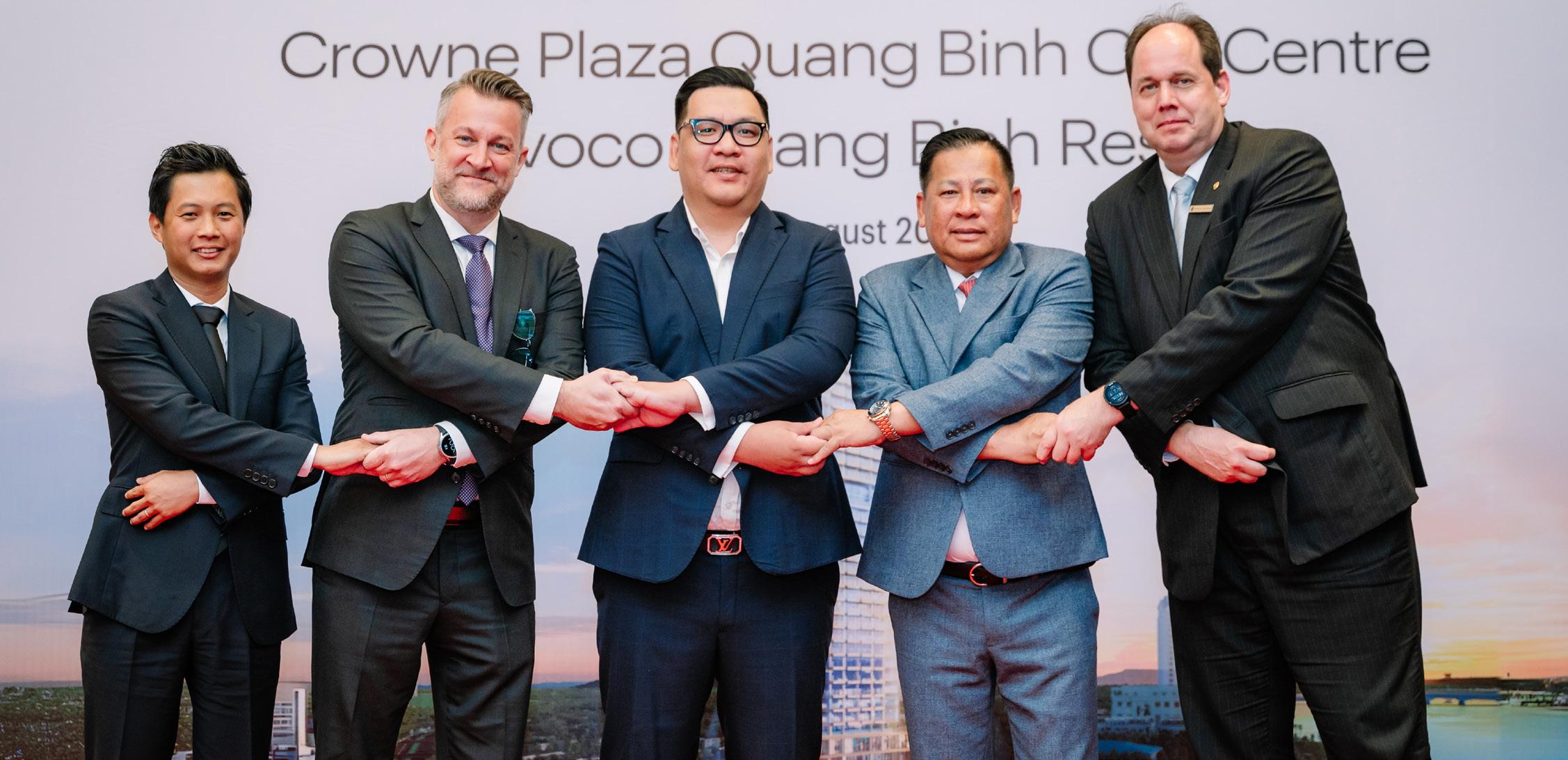
domestic-led destination with a great opportunity for growth. Its magnificent beauty includes Son Doong Cave – the largest cave in the world and home to towering stalagmites – underground rivers, a jungle with wildlife, and a 116-kilometre-long coastline with picturesque beaches such as Nhat Le and Da Nhay. The entry of voco hotels and Crowne Plaza Hotels & Resorts in Quang Binh will elevate the attraction of the destination for travellers to stay and explore its many wonders.”
Crowne Plaza Quang Binh City Centre will be situated within Royal Landmark, a mixed-used development that includes a commercial centre. It is a 15-minute drive from Dong Hoi Airport and a 45-minute flight from Hanoi Noi Bai International Airport and will also be within easy reach of Tan Son Nhat International Airport.
With a prime riverfront location situated close to government and commercial offices in Dong Hoi, facilities at the hotel will include four restaurants and bars, meeting spaces, swimming pool, fitness centre, spa, Kids Club and an executive lounge.
voco Quang Binh Resort will offer travellers a private beach with beautiful sea views and facilities including two
left to right: Dinh Trong Khoa, Senior Manager, Development at IHG, Chris Anklin, Senior Director, Development at IHG, Hoang Tien Thang, CEO of Hai Thanh Hung Investment Joint Stock Company and Vietnam Royal Investment and Construction Co., Ltd, Hoang Van Minh, Chairman of Hai Thanh Hung Investment Joint Stock Company and Vietnam Royal Investment and Construction Co., Ltd, Andrew Davidson, Regional General Manager, Vietnam and Laos
restaurants and bars, indoor and outdoor swimming pools, Kids Club, spa and resort centre.
Vietnam continues to be a strong growth market for IHG, with 18 hotels across six brands – Six Senses Hotels Resorts Spas, Regent Hotels & Resorts, InterContinental Hotels & Resorts, Crowne Plaza Hotels & Resorts, voco hotels and Holiday Inn Hotels & Resorts – and 26 properties in its pipeline. The company aims to grow its estate across all brands in the country, including the upcoming debuts of its Vignette Collection, Hotel Indigo and Holiday Inn Express brands. www.ihgplc.com


In Summer 2024, IYC introduced a new partner as part of the company’s environmental initiatives by supporting Artemis, a studentled environmental organization engaged in reducing beach pollution with simple, innovative solutions.
To preserve the pristine shores for generations to come, Artemis has been heavily involved in organizing beach cleanups in Greece for the last few years. Taking their initiatives a step further, and capitalizing on the 85,000 charter guests who come to enjoy Greek waters each year, they have created beach clean-up kits neatly packed in eco-tubes to be stored onboard yachts. These kits comprise three waste disposal bags, six pairs of gloves, an informative brochure, and guidelines for effective waste collection. Willing eco-conscious guests can become proactive guardians of the breathtaking landscapes and inspire voluntary clean-ups during their travels.
As part of IYC’s commitment to the cause, the company has purchased 1,000 eco-tubes from Artemis. These eco-tubes will be distributed within IYC’s fleet of yachts for charter, so they are always available on board, for clients (and crew alike) who believe in positive change and wish to combine the joy of yachting with a noble cause.

Interested in getting involved? The steps to making change and helping Artemis are simple:
• Find a beach with visible waste pollution
• Collect the waste (wearing the protective gloves and using the disposal bags)
• Dispose of the bags in large bins (typically found in marinas)
Finally, documenting the actions increases the impact. If possible:
• Take Pre and Post-cleanup photos, along with pictures of the volume of waste collected
• Scan the QR Code on the website to upload the images (when uploaded on site, pinpoints the cleanup efforts on their worldwide map)
Share on social #ArtemisCleanup
In recognition of participation, a “Certificate of Green Excellence” will be awarded to those who contribute to the beach cleanup efforts, as a testament of their dedication to environmental protection and social responsibility.
www.iyc.com

In recent years, Environmental, Social, and Governance (ESG) factors have transitioned from a niche concern to a central pillar of corporate strategy. ESG reporting, once considered a fringe activity, is now critical for businesses aiming to attract investors, maintain regulatory compliance, and drive long-term value creation. Leading companies across various industries, including technology giants like SAP, Google, and IBM, are at the forefront of this movement, integrating ESG into their core operations and decisionmaking processes. This article delves into the current state of ESG reporting, highlights the practices of key players, and examines the projects and initiatives that underscore their commitment to sustainability.
ESG reporting has evolved from a voluntary disclosure to a strategic necessity. Investors, regulators, and consumers increasingly demand transparency in how companies manage their environmental impact, social responsibilities, and governance structures. This demand has driven companies to adopt comprehensive ESG frameworks that not only report their performance but also align with global sustainability goals.
According to a 2023 report by the Global Sustainable Investment Alliance (GSIA), sustainable investments now represent over $35 trillion, or one-third of global assets under management. This surge
in sustainable investing underscores the growing importance of ESG factors in assessing a company's long-term viability. As a result, companies that fail to prioritize ESG risks and opportunities are at risk of losing out on capital, reputation, and market position.
Among the companies setting the standard for ESG reporting are technology leaders such as SAP, Google, and IBM. These companies have recognized that their scale and influence come with a responsibility to lead by example. They have implemented robust ESG strategies that not only comply with regulatory requirements but also drive innovation, enhance brand reputation, and contribute to societal progress.
SAP, a global leader in enterprise software, has integrated ESG into its business model, viewing it as a driver of innovation and growth. The company's approach to ESG is centered on its mission to help the world run better and improve people's lives. SAP has embedded sustainability into its product offerings, allowing customers to achieve their own ESG goals through SAP solutions.
One of SAP's most notable initiatives is its Climate 21 program, which helps companies measure and minimize their carbon footprints. Through this program,

SAP provides tools that allow businesses to track their emissions in real-time, offering insights that can lead to more sustainable decision-making. SAP's CEO, Christian Klein, has emphasized the importance of ESG in the company's strategy, stating, "Sustainability is not a trade-off with profitability. It's a driver of profitability." In addition to environmental initiatives, SAP has also made significant strides in social and governance aspects. The company has committed to diversity and inclusion, setting ambitious targets to increase the representation of women in leadership positions. Moreover, SAP has enhanced its governance framework to ensure that ESG factors are embedded at the highest levels of decision-making.
Google, a subsidiary of Alphabet Inc., is another leader in ESG reporting, particularly in its commitment to environmental sustainability. The company has set a bold vision to operate entirely on carbon-free energy by 2030, a goal that builds on its achievement of becoming carbon neutral in 2007 and matching its energy consumption with 100% renewable energy since 2017.
To achieve its 2030 target, Google is investing heavily in renewable energy projects, including wind and solar farms, and is advancing technologies to optimize energy efficiency in its data centers. Sundar Pichai, CEO of Alphabet and Google, highlighted the company's commitment to sustainability, saying, "We are focused on harnessing the benefits of technology to tackle climate change and drive positive environmental impact. Our goal is to operate on 24/7 carbon-free energy in all of our data centers by 2030."
Google's social and governance initiatives are equally robust. The company has implemented policies to ensure responsible AI development, focusing on fairness, transparency, and accountability. Additionally, Google has


made strides in improving workforce diversity, equity, and inclusion, setting measurable goals and regularly reporting on its progress.
IBM, a pioneer in technology and innovation, has long been committed to ESG principles. The company views ESG as integral to its strategy of building a smarter planet, where technology and data can solve some of the world's most pressing challenges.
IBM's environmental initiatives are driven by its commitment to achieving net-zero greenhouse gas emissions by 2030. To reach this goal, IBM is not only reducing its own emissions but also helping clients reduce their environmental impact through its AI and cloudbased solutions. One example is IBM's Environmental Intelligence Suite, which leverages AI to help businesses predict, manage, and mitigate environmental risks. This tool provides actionable insights that enable companies to enhance their sustainability performance while minimizing operational disruptions.
In the social and governance arenas, IBM has been a leader in promoting ethical practices and social responsibility. The company has a longstanding commitment to diversity and inclusion, with initiatives aimed at increasing representation across all levels of the organization. Additionally, IBM's governance framework ensures that ESG considerations are embedded in its corporate strategy, risk management, and stakeholder engagement.
Beyond the initiatives of SAP, Google, and IBM, several other companies are leading by example in their ESG reporting and practices. These companies are not only complying with ESG standards but also driving transformative projects that showcase the potential of ESG to create long-term value.
Microsoft has set an ambitious target to become carbon negative by 2030, meaning it will remove more carbon from the environment than it emits. To achieve this, Microsoft is investing in carbon capture and removal technologies, as well as renewable energy projects. The company has also launched a $1 billion Climate Innovation Fund to accelerate the development of sustainable technologies.
Microsoft's ESG strategy is not limited to environmental issues. The company is also focused on social impact, particularly in the areas of digital inclusion and accessibility. Microsoft's AI for Accessibility program aims to empower people with disabilities by providing them with the tools and resources needed to participate fully in society.
Unilever, a global consumer goods company, is renowned for its leadership in sustainability. The company has set ambitious ESG goals, including achieving net-zero emissions by 2039 and ensuring that 100% of its plastic packaging is reusable, recyclable, or compostable by 2025.
Unilever's commitment to ESG is also reflected in its social initiatives. The company has implemented programs to enhance the livelihoods of smallholder farmers and improve the health and wellbeing of millions of people worldwide. Unilever's CEO, Alan Jope, has emphasized the importance of ESG in the company's strategy, stating, "We believe that sustainable and equitable growth is the only way forward."
Tesla, the electric vehicle and clean energy company, has positioned itself as a leader in the transition to a sustainable future. The company's mission to accelerate the


world's transition to sustainable energy is reflected in its products, which include electric vehicles, solar panels, and energy storage solutions.
Tesla's ESG reporting highlights its achievements in reducing greenhouse gas emissions and promoting renewable energy. The company has also made significant strides in improving the sustainability of its supply chain, including initiatives to source materials responsibly and reduce waste.
While ESG reporting has become a strategic imperative, it is not without challenges. Companies face difficulties in standardizing ESG metrics, ensuring data accuracy, and aligning with diverse regulatory requirements. However, these challenges also present opportunities for innovation and leadership.
One of the key challenges in ESG reporting is the lack of standardized metrics. Companies often use different frameworks, such as the Global Reporting Initiative (GRI), the Sustainability Accounting Standards Board (SASB), and the Task Force on Climate-related Financial Disclosures (TCFD), making it difficult for investors to compare ESG performance across companies. To address this, there is a growing movement toward harmonizing ESG reporting standards, with organizations like the International Financial Reporting Standards (IFRS) Foundation working to develop a global ESG reporting framework.
Data accuracy is another challenge in ESG reporting. Companies must ensure that the data they report is reliable, consistent, and verifiable. This requires robust data management systems and processes, as well as third-party assurance in some cases. Companies like SAP are leveraging technology to address this challenge by providing software solutions that enable real-time ESG data tracking and reporting.
Despite these challenges, ESG reporting presents significant opportunities for companies to differentiate themselves in the marketplace. Companies that excel in ESG reporting are better positioned to attract investors, customers, and talent, as well as to mitigate risks and capitalize on opportunities. Moreover, effective ESG reporting can enhance a company's reputation, strengthen stakeholder relationships, and contribute to long-term value creation.
As ESG reporting continues to evolve, it is likely to become even more integral to corporate strategy and decision-making. Companies that embrace ESG principles and integrate them into their operations will be better equipped to navigate the challenges and opportunities of the 21st century.
Looking ahead, several trends are likely to shape the future of ESG reporting. First, there will be an increasing emphasis on climate-related disclosures, particularly as governments and regulators ramp up efforts to address climate change. Companies will need to provide more detailed and forward-looking information on how they are managing climate risks and opportunities.
Second, social issues such as diversity, equity, and inclusion (DEI) are expected to gain prominence in ESG reporting. Investors and stakeholders are increasingly demanding transparency on how companies are addressing social inequalities and promoting inclusive growth. Companies will need to set measurable DEI goals and report on their progress.


Third, technological advancements will play a critical role in enhancing ESG reporting. Companies will increasingly use digital tools, such as AI and blockchain, to improve the accuracy, efficiency, and transparency of their ESG reporting processes. These technologies will also enable companies to analyze ESG data in real-time and make more informed decisions.
ESG reporting has emerged as a critical component of corporate strategy, driven by the growing demand for transparency and accountability. Leading companies like SAP, Google, and IBM are setting the standard for ESG excellence, demonstrating that sustainability and profitability can go hand in hand. Through innovative projects and initiatives, these companies are not only meeting regulatory requirements but also driving positive environmental, social, and governance outcomes.
As ESG reporting continues to evolve, it will play an increasingly important role in shaping the future of business. Companies that embrace ESG principles and integrate them into their operations will be better positioned to thrive in a rapidly changing world. The future of ESG reporting holds great promise, offering companies the opportunity to create long-term value while contributing to a more sustainable and equitable future.


In the ever-evolving digital era, Big Data has emerged as a cornerstone for businesses, governments, and institutions worldwide. What was once a niche field reserved for tech enthusiasts and specialists has now infiltrated every industry, driving decisions and innovations that are reshaping our world. From healthcare and finance to entertainment and agriculture, Big Data is a critical tool that enables organizations to analyze massive amounts of information to uncover patterns, trends, and insights that were previously hidden or unattainable.
This article delves into the prominent companies leading the charge in Big Data, explores groundbreaking use cases, and features insights from senior leaders who are steering the future of this transformative technology.
Several companies stand at the forefront of Big Data, driving its development and application across various sectors. Among these, tech giants like Microsoft, Google, Amazon, and Salesforce are not only investing heavily in Big Data technologies but are also setting industry standards through their platforms and services.
Microsoft has been a leader in cloud computing and Big Data analytics with its Azure platform. Azure provides a comprehensive suite of tools and services that allow businesses to manage, analyze, and visualize data at scale. One of Microsoft's significant contributions to Big Data is its development of Azure Synapse Analytics, an integrated analytics
service that brings together big data and data warehousing. This service enables companies to ingest, prepare, manage, and serve data for immediate business intelligence needs.
Google is another key player, leveraging its Big Data capabilities through platforms like Google BigQuery. BigQuery is a serverless, highly scalable, and costeffective multi-cloud data warehouse that is designed for business agility. Google’s expertise in managing vast amounts of data has also been evident through its Google Analytics platform, which has become the gold standard for digital marketing analytics.
Amazon Web Services (AWS), arguably the largest cloud services provider globally, offers a robust set of tools for Big Data analytics. AWS’s S3 (Simple Storage Service) and Redshift, a fully managed data warehouse service, are critical components for businesses looking to store and analyze massive amounts of data. AWS also provides EMR (Elastic MapReduce), which allows organizations to process vast amounts of data using open-source tools like Apache Hadoop and Apache Spark.
Salesforce, while traditionally known as a leader in customer relationship management (CRM), has also made significant strides in Big Data. With its Salesforce Einstein Analytics (now Tableau CRM), the company has integrated advanced analytics and AI into its CRM platform, allowing businesses to generate predictive insights from their customer data.

The application of Big Data spans across various industries, each leveraging this technology in unique ways to drive efficiency, innovation, and growth.
In healthcare, Big Data is transforming patient care and operational efficiency. One notable example is IBM Watson Health, which uses Big Data and AI to support medical professionals in diagnosing diseases and developing personalized treatment plans. By analyzing vast amounts of medical literature, patient records, and clinical trials, Watson can provide evidence-based insights that improve patient outcomes.
Additionally, Big Data is critical in pandemic response efforts. During the COVID-19 pandemic, several organizations utilized Big Data analytics to track the spread of the virus, predict outbreak hotspots, and manage resources effectively. For instance, Johns Hopkins University used data visualization tools to create a COVID-19 dashboard that became a crucial resource for governments and the public.
The finance industry relies heavily on Big Data for risk management and fraud detection. JPMorgan Chase, one of the largest banks in the world, uses Big Data analytics to detect fraudulent activities by analyzing patterns in transaction data. This real-time analysis helps in flagging suspicious activities before they result in significant losses.
Moreover, Big Data is crucial in algorithmic trading, where vast amounts of financial data are analyzed in real-time to make trading decisions. Goldman Sachs and other major financial institutions use Big Data to gain a competitive edge in trading by predicting market trends and automating trades.
Retailers are using Big Data to understand consumer behavior and personalize the shopping experience. Walmart, the world’s largest retailer, employs Big Data analytics to manage its supply chain, optimize pricing, and predict demand. By analyzing data from its vast network of stores and online platforms, Walmart can make realtime decisions that enhance customer satisfaction and improve operational efficiency.
Another example is Amazon, which uses Big Data to power its recommendation engine. By analyzing browsing history, purchase patterns, and customer reviews, Amazon can suggest products that are highly relevant to individual customers, driving higher sales and customer loyalty.
In agriculture, Big Data is being used to improve crop yields and manage resources more effectively. Companies like John Deere are integrating Big Data and IoT (Internet of Things) into their machinery to collect data on soil conditions, weather patterns, and crop health. This data is then analyzed to provide farmers with actionable insights that help them optimize planting schedules, irrigation, and harvesting, ultimately leading to better yields and reduced costs.
The entertainment industry is also a significant beneficiary of Big Data. Streaming services like Netflix and Spotify use Big Data analytics to understand user preferences and personalize content recommendations. Netflix, for example, uses data on viewing habits, search history, and ratings to recommend shows and movies that align with individual tastes. This data-driven approach has been a key factor in Netflix’s success, as it keeps viewers engaged and subscribed to the platform.


Several Big Data projects and initiatives are paving the way for future innovations. These projects highlight the potential of Big Data to solve complex challenges and create new opportunities.
One of the most impactful Big Data initiatives is Project Data Sphere, an independent, not-for-profit initiative that provides an open-access digital library for oncology research. By aggregating and sharing clinical trial data from various sources, Project Data Sphere allows researchers to accelerate cancer research and develop new treatments. The initiative exemplifies how Big Data can be used to foster collaboration and drive significant advancements in healthcare.
The Human Genome Project is another landmark Big Data initiative that has had profound implications for science and medicine. By mapping the entire human genome, this project generated an enormous amount of data that researchers are now using to understand the genetic basis of diseases and develop targeted therapies. The success of the Human Genome Project has spurred numerous other genomics initiatives, all of which rely on Big Data to push the boundaries of our understanding of human biology.
Around the world, cities are becoming smarter by leveraging Big Data to improve urban planning and management. Barcelona, for instance, has implemented a smart city initiative that uses data from sensors installed throughout the city to manage resources like water and electricity more efficiently. The city also uses data to optimize public
transportation routes, reduce traffic congestion, and enhance public safety. These initiatives demonstrate how Big Data can be used to create more sustainable and livable cities.

Microsoft’s AI for Earth program is an ambitious initiative that combines Big Data and artificial intelligence to tackle environmental challenges. The program supports projects that use data to address issues such as climate change, biodiversity loss, and water scarcity. For example, Microsoft is working with conservation organizations to analyze satellite imagery and predict deforestation, allowing for more effective conservation efforts. AI for Earth is a prime example of how Big Data can be used to promote environmental sustainability and address some of the most pressing challenges facing our planet.
Senior leaders from some of the most influential companies in the world have shared their perspectives on the importance of Big Data and its impact on business and society.
Satya Nadella, CEO of Microsoft, has often emphasized the transformative power of Big Data and AI. In a recent interview, he stated, “Data is the new electricity—it has the ability to transform industries, create new opportunities, and improve the quality of life for billions of people around the world. At Microsoft, we are committed to democratizing data and ensuring that everyone has access to the tools and resources they need to harness its power.”
Marc Benioff, CEO of Salesforce, also highlighted the importance of Big Data in driving innovation. “At Salesforce, we believe that data is the foundation of the Fourth Industrial Revolution. Our customers rely on us to help them navigate this new era by providing them with the insights they need to connect with their customers in more meaningful
ways. Big Data, combined with AI, is at the heart of this transformation.”
Andy Jassy, CEO of Amazon (and previously head of AWS), has spoken about how Big Data is central to Amazon’s business strategy. “At Amazon, we’re obsessed with using data to improve the customer experience. Whether it’s through personalized recommendations on our retail platform or optimizing our logistics network, Big Data plays a crucial role in everything we do.”
The future of Big Data is bright, with new technologies and innovations continually expanding its potential. As more devices become connected through the Internet of Things (IoT), the volume of data generated will continue to grow exponentially. This will create new opportunities for businesses to gain insights and improve their operations.
However, the rise of Big Data also raises important ethical and privacy concerns. As companies collect more data on individuals, there is a growing need for robust data governance frameworks that protect privacy and ensure that data is used responsibly. Companies like

Google and Microsoft are investing in technologies that enhance data privacy, such as differential privacy and federated learning, which allow data to be analyzed without compromising individual privacy.
Moreover, the integration of artificial intelligence with Big Data is set to unlock even more possibilities. AI can process and analyze vast amounts of data far more efficiently than humans, leading to new insights and innovations. For instance, AIdriven Big Data analytics are already being used to develop personalized medicine, optimize supply chains, and predict consumer behavior with unprecedented accuracy.
In conclusion, Big Data is more than just a buzzword—it is a powerful tool that is reshaping industries, driving innovation, and solving complex challenges. The companies leading the charge in Big Data, such as Microsoft, Google, Amazon, and Salesforce, are not only pushing the boundaries of what is possible but are also setting the stage for the future of business and society. As we continue to generate and analyze more data, the potential of Big Data to improve our world is limitless. The key will be ensuring that this potential is harnessed responsibly, with a focus on ethics, privacy, and sustainability.

The insurance industry, often seen as a bastion of tradition and stability, is undergoing a seismic transformation. This change is driven by InsurTech, a dynamic blend of insurance and technology that is redefining the way insurers operate, how customers interact with insurance products, and even the very nature of risk management. As digitalization permeates every aspect of our lives, the insurance sector is embracing these advancements to enhance customer experience, optimize operations, and craft new products tailored to the evolving needs of the modern world.
Leading this revolution are some of the largest insurance companies globally, such as Generali, Liverpool Victoria (LV=), and Allianz, among others. These giants are not just adopting InsurTech solutions; they are spearheading innovation through strategic investments, collaborations, and in-house developments. This article delves into how these companies are leveraging InsurTech to stay ahead

in the fiercely competitive insurance market, highlighting key use cases, groundbreaking projects, and insights from industry leaders.
Generali: Innovating with Purpose
Generali, one of the oldest and largest insurance companies in Europe, has been at the forefront of embracing digital transformation. With a history spanning nearly two centuries, Generali understands the importance of adapting to changing times. The company’s approach to InsurTech is deeply rooted in its broader strategy of becoming a lifetime partner to its customers, ensuring that its services are not only comprehensive but also personalized and accessible.
One of the standout projects by Generali is the "Human Safety Net" initiative, which leverages digital tools to offer support to vulnerable communities. This program focuses on enhancing the lives of families and refugees by providing them with access to resources, financial support, and
opportunities to build a sustainable future. Generali has employed data analytics and mobile technologies to monitor the impact of these programs in real-time, ensuring that resources are allocated efficiently and effectively.
In addition, Generali has been a key player in the development of Telemedicine and Digital Health solutions. Through partnerships with InsurTech startups, Generali has integrated telemedicine into its health insurance products, allowing customers to access medical consultations and health services from the comfort of their homes. This move not only enhances customer experience but also reduces costs and streamlines claims processing.
"At Generali, we believe that technology is not just an enabler but a driver of change. Our commitment to InsurTech reflects our broader mission to innovate with purpose,

ensuring that we meet the needs of our customers in an ever-changing world," says Marco Sesana, CEO of Generali Italy and Global Business Lines.
Liverpool Victoria (LV=): CustomerCentric Digital Transformation
Liverpool Victoria, better known as LV=, is another insurance powerhouse that has fully embraced the InsurTech wave. With a history dating back to 1843, LV= has consistently evolved to meet the demands of its customers. Today, the company’s digital transformation strategy is heavily focused on enhancing customer experience through technology.
One of LV=’s flagship projects is the "Digital Advisor" platform, which uses artificial intelligence (AI) to offer personalized insurance advice to customers. This platform, developed
in collaboration with leading AI firms, allows customers to receive tailored recommendations based on their individual needs and preferences. By analyzing vast amounts of data, the Digital Advisor can suggest the most suitable insurance products, helping customers make informed decisions with ease.
LV= has also made significant strides in claims automation. The company has implemented AI-driven systems that can process claims in a fraction of the time it would take a human. This not only speeds up the claims process but also reduces the likelihood of errors, leading to higher customer satisfaction. According to Stuart Simpson, Director of Digital Transformation at LV=, "Our investment in AI and automation is part of our ongoing commitment to putting our customers first. We understand that the claims process can be stressful, and our goal is

to make it as seamless and efficient as possible."
Another notable initiative by LV= is its focus on Telematics in Car Insurance. By using telematics devices, which monitor driving behavior, LV= offers personalized premiums to drivers. This usage-based insurance model has proven particularly popular among younger drivers, who can benefit from lower premiums by demonstrating safe driving habits. The data collected through telematics also helps LV= in underwriting, enabling more accurate risk assessments and pricing.
As one of the largest insurance companies in the world, Allianz has long been a leader in innovation. The company’s approach to InsurTech is characterized by its heavy
investment in data analytics and artificial intelligence. Allianz understands that in today’s digital age, data is the new oil, and AI is the engine that can extract its full value.
One of Allianz’s most significant InsurTech initiatives is the "Allianz AI Lab", which focuses on developing AI-driven solutions for various aspects of the insurance business. From predictive analytics in underwriting to AI-powered customer service chatbots, the Allianz AI Lab is at the cutting edge of InsurTech innovation. For instance, Allianz has implemented AI to predict and prevent customer churn by analyzing patterns in customer behavior and proactively addressing potential issues before they lead to dissatisfaction.
Another area where Allianz is making waves is in parametric insurance. This innovative insurance model uses

predefined parameters, such as weather conditions or natural disasters, to trigger automatic payouts. For example, Allianz’s "Weather Protect" product offers businesses protection against adverse weather conditions that could impact their operations. If a specific weather event occurs, such as a storm exceeding a certain threshold, the policyholder receives an automatic payout without the need for a traditional claims process. This not only speeds up the compensation process but also provides greater certainty to policyholders.
Allianz is also exploring the use of blockchain technology to enhance transparency and security in insurance transactions. By utilizing blockchain, Allianz aims to create tamper-proof records of policies and claims, reducing the risk of fraud and ensuring that all parties involved have access to the same,
immutable data. This could revolutionize the way insurance contracts are managed, particularly in complex areas such as reinsurance.
"We are entering a new era of insurance, where data and AI are at the heart of everything we do. At Allianz, we are committed to leveraging these technologies to not only improve our operations but also to create more value for our customers," states Iván de la Sota, Chief Business Transformation Officer at Allianz SE.
AXA, another global insurance leader, has also embraced InsurTech with a particular focus on blockchain technology and cyber insurance. As cyber threats become increasingly sophisticated, AXA has

recognized the need for robust insurance solutions that can protect businesses and individuals from the financial fallout of cyber-attacks.
One of AXA’s flagship projects in this area is "AXA Sure", a blockchain-based flight delay insurance product. This innovative product automatically compensates policyholders if their flight is delayed by more than two hours. By leveraging blockchain, AXA Sure ensures that the entire process is transparent, secure, and automated, with no need for the policyholder to file a claim. The success of AXA Sure has paved the way for the company to explore other blockchain applications in insurance, particularly in areas like reinsurance and smart contracts.
In addition to blockchain, AXA has been a pioneer in the field of cyber insurance. As businesses increasingly rely on digital


infrastructure, the risk of cyber-attacks has grown exponentially. AXA has developed comprehensive cyber insurance products that not only cover the financial losses resulting from cyber incidents but also provide access to expert support services for incident response and recovery. This holistic approach ensures that businesses are not only protected financially but are also equipped to respond effectively to cyber threats.
"Cyber risk is one of the biggest challenges facing businesses today, and we are committed to providing innovative solutions that address this evolving threat landscape. Our focus on blockchain and cyber insurance is part of our broader strategy to lead the way in InsurTech innovation," says
Etienne Bouas-Laurent,
Group Chief Financial Officer at AXA.
Swiss Re: Transforming Reinsurance with Digital Ecosystems
Swiss Re, one of the largest reinsurers in the world, has taken a unique approach to InsurTech by focusing on building digital ecosystems that bring together various stakeholders in the insurance value chain. Swiss Re’s strategy revolves around collaboration, recognizing that the complexity of the insurance industry requires a collective effort to drive meaningful innovation.
One of Swiss Re’s most notable projects is the "Digital Market Center", a platform that leverages data analytics and AI to provide real-time insights to insurers. This platform enables insurers to make more informed decisions about risk selection, pricing, and claims management. By offering a centralized hub for data and analytics, Swiss Re is helping insurers to optimize their operations and improve profitability.
Swiss Re has also been a leader in the development of IoT (Internet of Things) based insurance solutions. Through partnerships with technology companies, Swiss Re is exploring the use of IoT devices to collect real-time data on various risks, such as property damage or health conditions. This data can then be used
to offer more personalized insurance products and to mitigate risks before they result in claims. For example, Swiss Re has been involved in projects that use IoT sensors to monitor the health of crops, providing farmers with insurance coverage that is tailored to their specific needs and conditions.
"We believe that the future of reinsurance lies in building digital ecosystems that connect all the players in the industry. By harnessing the power of data and technology, we can create more resilient and efficient insurance solutions that benefit everyone involved," says Christian Mumenthaler, CEO of Swiss Re.
Munich Re, another global leader in reinsurance, has focused its InsurTech efforts on addressing the growing challenges posed by climate change. Recognizing the significant impact that climate risks can have on the insurance industry, Munich Re has developed a range of innovative solutions that leverage technology to better understand and mitigate these risks.
One of Munich Re’s key initiatives is the "NatCatSERVICE" platform, which provides detailed data and analytics on natural catastrophes. This platform uses AI and machine learning to model the potential impact of various climaterelated events, such as hurricanes, floods, and wildfires. By offering insurers access to this data, Munich Re helps them to better assess their exposure to climate risks and to develop more accurate pricing models.
Munich Re has also been a leader in the development of parametric insurance for climate risks. Similar to Allianz’s efforts in this area, Munich Re offers parametric insurance products that provide automatic payouts based on predefined triggers, such as the occurrence of a natural disaster. These products are particularly valuable in regions that are prone to extreme weather events, where


traditional insurance models may struggle to provide adequate coverage.
"Climate change is one of the biggest challenges facing our industry, and we are committed to developing innovative solutions that help our clients manage these risks. Our focus on InsurTech is driven by the belief that technology can play a crucial role in creating a more sustainable future for everyone," states Torsten Jeworrek, Member of the Board of Management at Munich Re.
While the InsurTech revolution presents significant opportunities for the insurance industry, it also comes with its own set of challenges. Regulatory compliance, data privacy, and the need for significant investments in technology infrastructure are just a few of the hurdles that insurers must overcome. However, the potential benefits of InsurTech far outweigh these challenges, as it offers a path to greater efficiency, enhanced customer satisfaction, and new revenue streams.
As the examples of Generali, LV=, Allianz, AXA, Swiss Re, and Munich Re demonstrate, the insurance industry is no longer content to rely on traditional models. These companies are leading the way in embracing technology to transform their operations and create more value
for their customers. Whether through AI-driven claims processing, blockchainbased insurance products, or IoT-enabled risk management, the future of insurance is being shaped by innovation.
As the industry continues to evolve, one thing is clear: those who fail to embrace InsurTech risk being left behind. The leaders of tomorrow’s insurance industry will be those who can successfully integrate technology into their business models, creating a seamless, customercentric experience that meets the needs of the modern world.
In the words of Marco Sesana of Generali, "The insurance industry is at a crossroads, and the choices we make today will determine our success in the future. By embracing InsurTech, we are not only preparing for the future but actively shaping it."
The insurance industry stands on the brink of a new era, one that is defined by technology and innovation. The companies leading the charge, from Generali to Munich Re, are not just adapting to change—they are driving it. Through strategic investments in InsurTech, these companies are redefining what it means to be an insurer in the 21st century. The road ahead is filled with challenges, but for those who are willing to embrace the possibilities of InsurTech, the opportunities are boundless.
The Chief Financial Officer (CFO) is a critical member of the executive team, playing a pivotal role in shaping the financial health and overall strategy of an organization. In an increasingly complex global economy, the responsibilities of CFOs have expanded far beyond traditional accounting and financial reporting. They are now central figures in corporate governance, risk management, and strategic planning, often acting as the right hand of the CEO.
Microsoft Corporation
Amy Hood has been the CFO of Microsoft since 2013 and has played a key role in the company’s growth, particularly in its transition to cloud computing. Under her financial leadership, Microsoft has seen its revenue and profitability soar, making it one of the most valuable companies in the world. Hood’s strategic focus on cloud services and intelligent edge solutions has positioned Microsoft as a leader in the tech industry. She is known for her deep understanding of technology and her ability to align financial strategies with the company’s broader innovation goals.

Alphabet Inc.

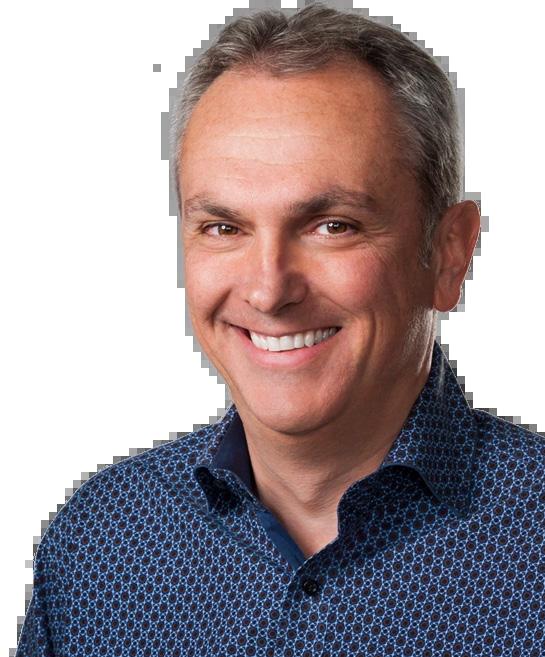
Apple Inc.
Ruth Porat became the CFO of Alphabet Inc. and its subsidiary Google in 2015. She has been instrumental in driving Alphabet’s financial strategy, managing its vast portfolio of investments, and leading its finance operations through significant periods of growth. Porat is credited with bringing greater fiscal discipline to the company, which has helped in optimizing its operations and enhancing shareholder value. Her previous experience as CFO at Morgan Stanley has endowed her with a strong background in investment banking and corporate finance, which she has effectively leveraged at Alphabet. She has since become Chief Investment Officer.

Luca Maestri has served as the CFO of Apple since 2014. He plays a critical role in managing Apple’s global finance operations, including its vast supply chain and investment strategies. Maestri has overseen the company’s financial operations during a period of unprecedented growth, including the launch of new product lines and services. His approach to capital allocation and shareholder returns has been highly praised, particularly his management of Apple’s cash reserves, which are among the largest in the world.
JPMorgan Chase & Co.
Jeremy Barnum is the Chief Financial Officer of JPMorgan Chase & Co. and a member of the firm’s Operating Committee. As CFO, Jeremy is responsible for Global Finance and Business Management, the Chief Administrative Office, the Treasury/Chief Investment Office, Control Management and Business Resiliency.Since joining the firm in 1994, Jeremy has held a number of leadership roles including head of Global Research for J.P. Morgan’s Corporate & Investment Bank (CIB), and Chief Financial Officer and Chief of Staff for the Corporate & Investment Bank from 2013 to 2021.
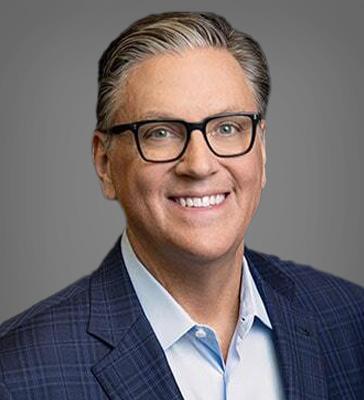
Amazon.com, Inc.
Brian Olsavsky became the CFO of Amazon in 2015 after serving in various roles within the company since 2002. He is known for his deep understanding of Amazon’s complex business model and his ability to manage the financial intricacies of its vast operations, including its rapid expansion into cloud computing through Amazon Web Services (AWS). Olsavsky’s focus on long-term growth and investment has been key to Amazon’s continued dominance in the global marketplace.
Nestlé S.A.
François-Xavier Roger has been the CFO of Nestlé since 2015. He has been instrumental in transforming the company’s financial operations to support its strategic goals, including a greater focus on health, nutrition, and wellness products. Roger’s expertise in managing largescale financial operations and his focus on efficiency and cost control have contributed to Nestlé’s ability to adapt to changing market conditions while maintaining profitability.

Levi Strauss & Co.


Harmit Singh has been the CFO of Levi Strauss since 2013. He has played a pivotal role in the company’s turnaround strategy, focusing on operational efficiency, digital transformation, and global expansion. Singh’s leadership in finance has been critical in repositioning Levi’s brand in a competitive retail environment. His focus on data-driven decision-making and disciplined financial management has enabled Levi Strauss to strengthen its financial position and purs

Suzlon Marshal
General Motors
Paul Jacobson joined General Motors as CFO in 2020, bringing with him a wealth of experience from his time as CFO at Delta Air Lines. At GM, Jacobson has been instrumental in steering the company through significant industry changes, including the shift towards electric vehicles and sustainable transportation solutions. His financial stewardship is focused on balancing short-term financial performance with long-term strategic investments, ensuring GM’s competitiveness in a rapidly evolving automotive industry.
Fernandes is the Chief Financial Officer (CFO) of Suzlon Energy, specifically overseeing the company’s international business operations. With a robust financial background, Marshal has been instrumental in driving Suzlon’s financial strategy, particularly in the renewable energy sector. His expertise in financial management has earned him recognition, including the title of “Best Renewable Energy Solutions CFO” in 2024 at the Global CFO Excellence Awards.Marshal’s leadership is pivotal in Suzlon’s commitment to sustainability and innovation within the renewable energy space. His role encompasses strategic financial planning, risk management, and ensuring the company’s financial health aligns with its long-term goals in the competitive global market

Salesforce
Amy is responsible for leading Salesforce’s global finance organization.Before her appointment in 2021, Amy was Chief Legal Officer. She built the global legal and corporate affairs organizations at Salesforce and drove many of the company’s most important strategic and operational initiatives, from deepening customer and government relationships to executing complex financial transactions.Before Salesforce, she was EVP and General Counsel at Univar and SVP and Deputy General Counsel at Expedia Group. Amy also practiced law at Cravath, Swaine & Moore and at Perkins Coie.
A CFO’s expertise in managing financial risks, capital allocation, and economic forecasting is crucial for sustaining profitability and ensuring long-term growth. They are responsible for driving efficiency across all financial operations, from budgeting to investment decisions, while ensuring compliance with regulatory requirements. In a landscape where technological advancements and globalization are constantly reshaping business environments, the modern CFO must also be adept at leveraging data analytics and digital tools to provide actionable insights.

CFOs are increasingly involved in decision-making processes that extend well beyond finance, influencing areas such as mergers and acquisitions, corporate restructuring, and market expansion. Their role requires a deep understanding of both the external economic landscape and the internal operational dynamics of the company. This dual focus allows them to anticipate challenges, capitalize on opportunities, and drive sustainable value creation.
In today’s volatile and competitive market, the CFO’s role is more critical than ever. Companies rely on their financial leaders to navigate uncertainty, optimize resources, and lead initiatives that support both short-term objectives and long-term strategic goals. The following is a list of ten of the most influential CFOs globally, each of whom exemplifies the expertise, leadership, and strategic vision required in this demanding role.


In a significant development for the UK’s automotive recycling and vehicle dismantling industry, Charles Trent Ltd is making waves with its latest strategic moves. Established in 1964, the company has long been recognized for its dedication to sustainability and operational excellence. As it steps into 2024, Charles Trent Ltd is set to redefine industry standards with a groundbreaking partnership with Snapfulfil, a leader in cloud-based warehouse management solutions. This collaboration is expected to usher in a new era of efficiency and technological advancement for the company.
Charles Trent Ltd, headquartered in Poole, Dorset, has built a reputation for its environmentally responsible recycling practices and high-quality service. The company’s vision for 2024 includes a robust strategy to enhance operational efficiency and expand its market presence through strategic technological partnerships. At the helm of this transformative journey is CEO David Trent, whose leadership is guiding the company into a new phase of growth and innovation.

PROJECT DIRECTED BY: JAMIE WAITE
ARTICLE WRITTEN BY: LAURA WATLING
David Trent shared his enthusiasm for the company’s new direction: “At Charles Trent Ltd, we have always prided ourselves on our commitment to excellence and sustainability. This year marks a pivotal moment for us as we integrate advanced technologies into our operations. Our partnership with Snapfulfil is a major step towards achieving greater efficiency and accuracy in our processes.”
The alliance with Snapfulfil represents a strategic leap forward for Charles Trent Ltd. Snapfulfil, a UK-based provider of cloud-based warehouse management systems (WMS), is renowned for its ability to streamline warehouse operations through innovative technology. The collaboration aims to enhance Charles Trent’s inventory management, order fulfillment, and overall operational efficiency.
Snapfulfil’s WMS solution will enable Charles Trent Ltd to optimize its warehouse operations by providing realtime visibility into inventory, automating key processes, and improving accuracy in order processing. The integration of Snapfulfil’s technology is expected to significantly reduce operational costs and increase productivity.
David Trent elaborated on the significance of this partnership: “Snapfulfil’s technology is a game-changer for our operations. Their cloud-based WMS will provide us with unparalleled insights and control over our inventory and logistics processes. This partnership aligns perfectly with our goal of leveraging technology to drive efficiency and enhance our service offerings.”
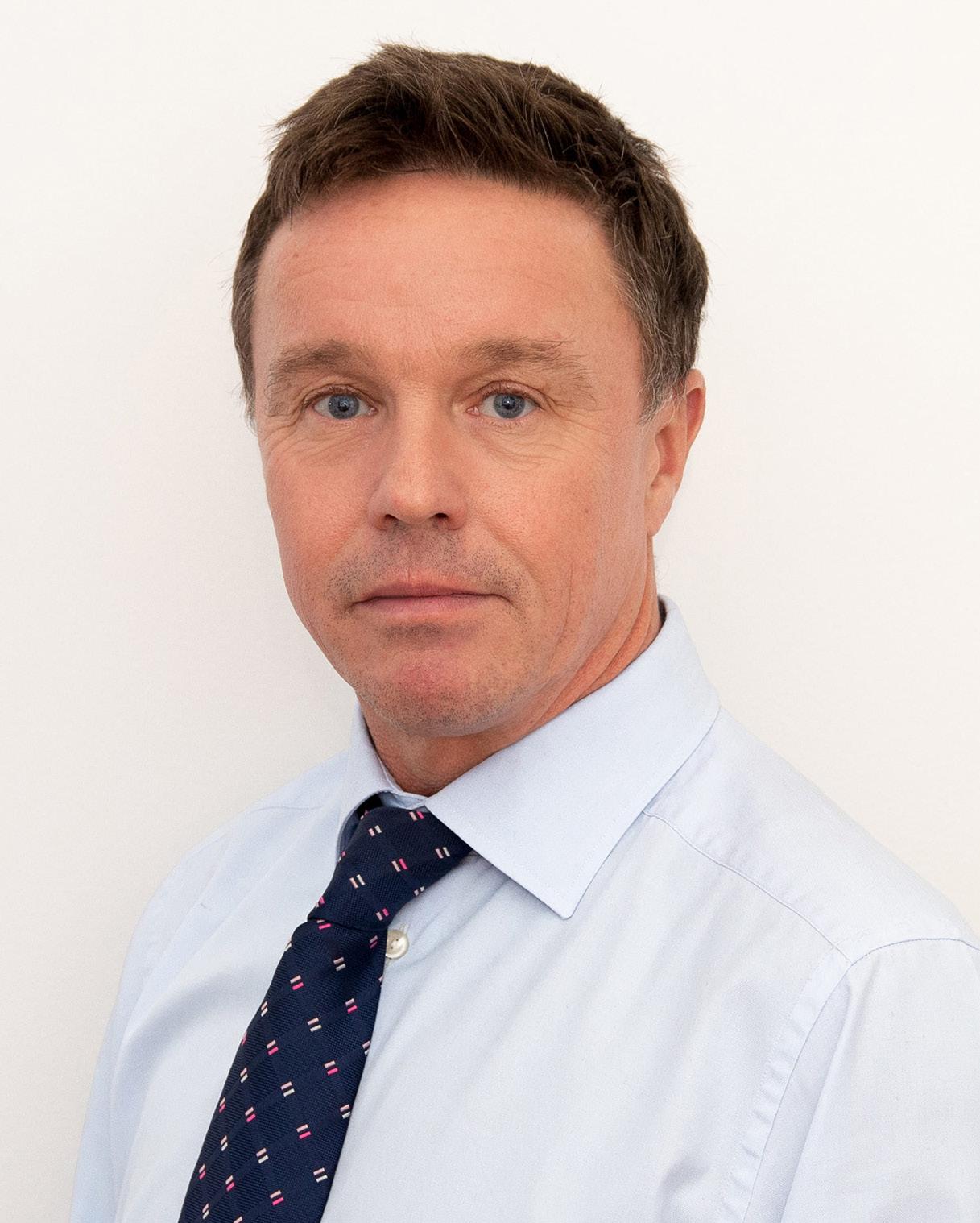



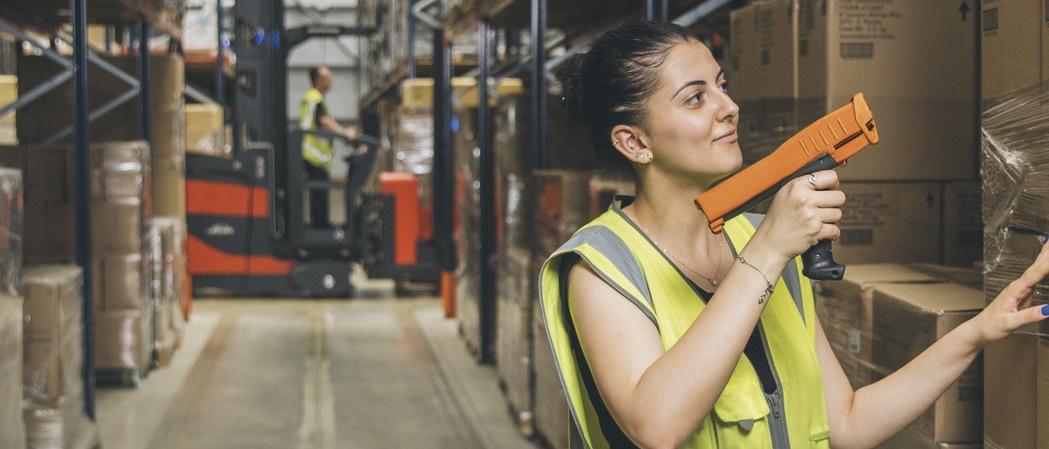
SnapFulfil is a cloud-based, Tier 1 warehouse management system with flexibility at its core.
It delivers cutting edge technology at a fraction of the cost of traditional installations and, unlike other warehouse management systems, is quick and easy to implement, giving you a rapid return on investment.
Once up and running SnapFulfil is highly configurable and can adapt to meet evolving fulfilment demands.


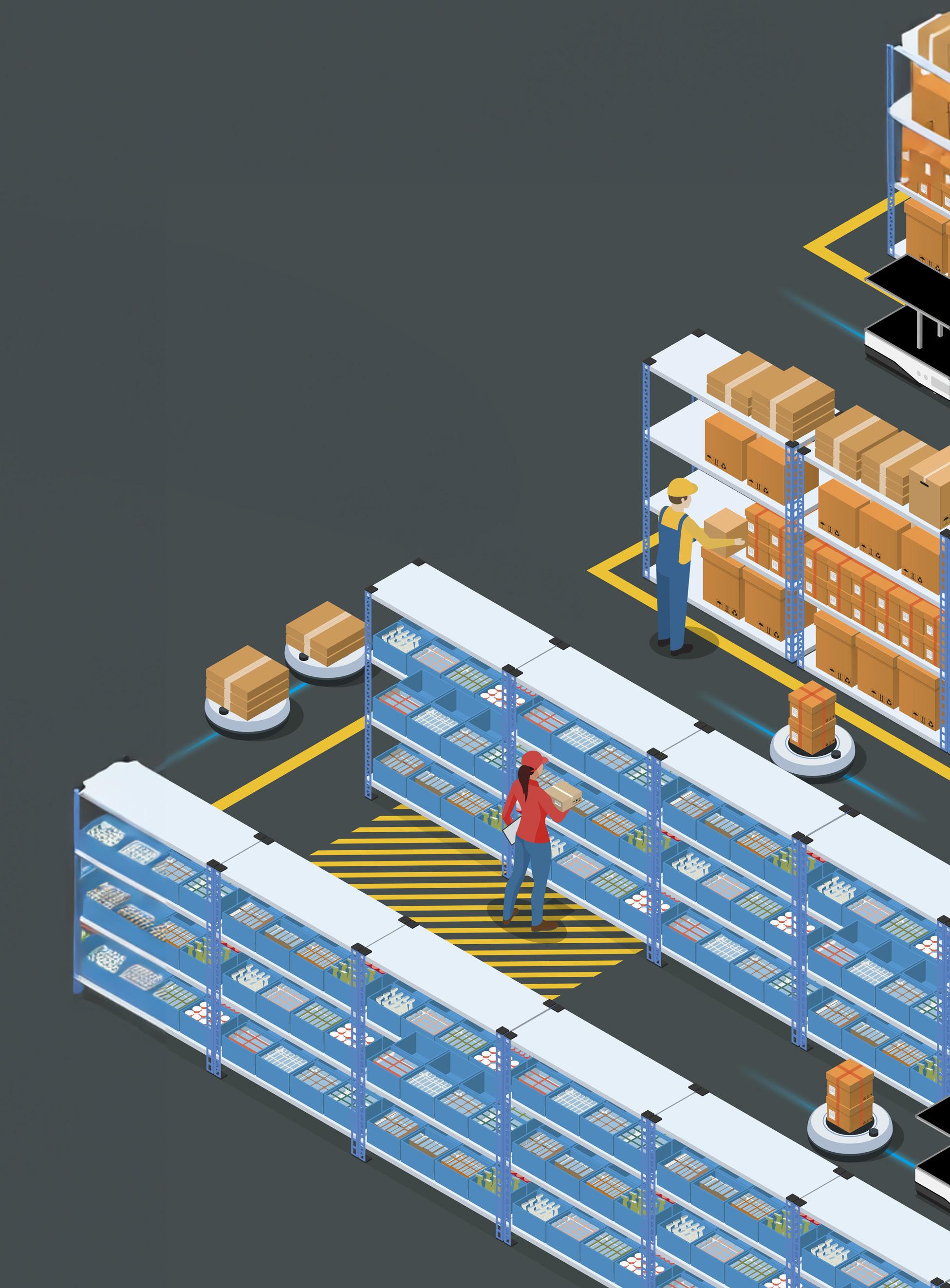
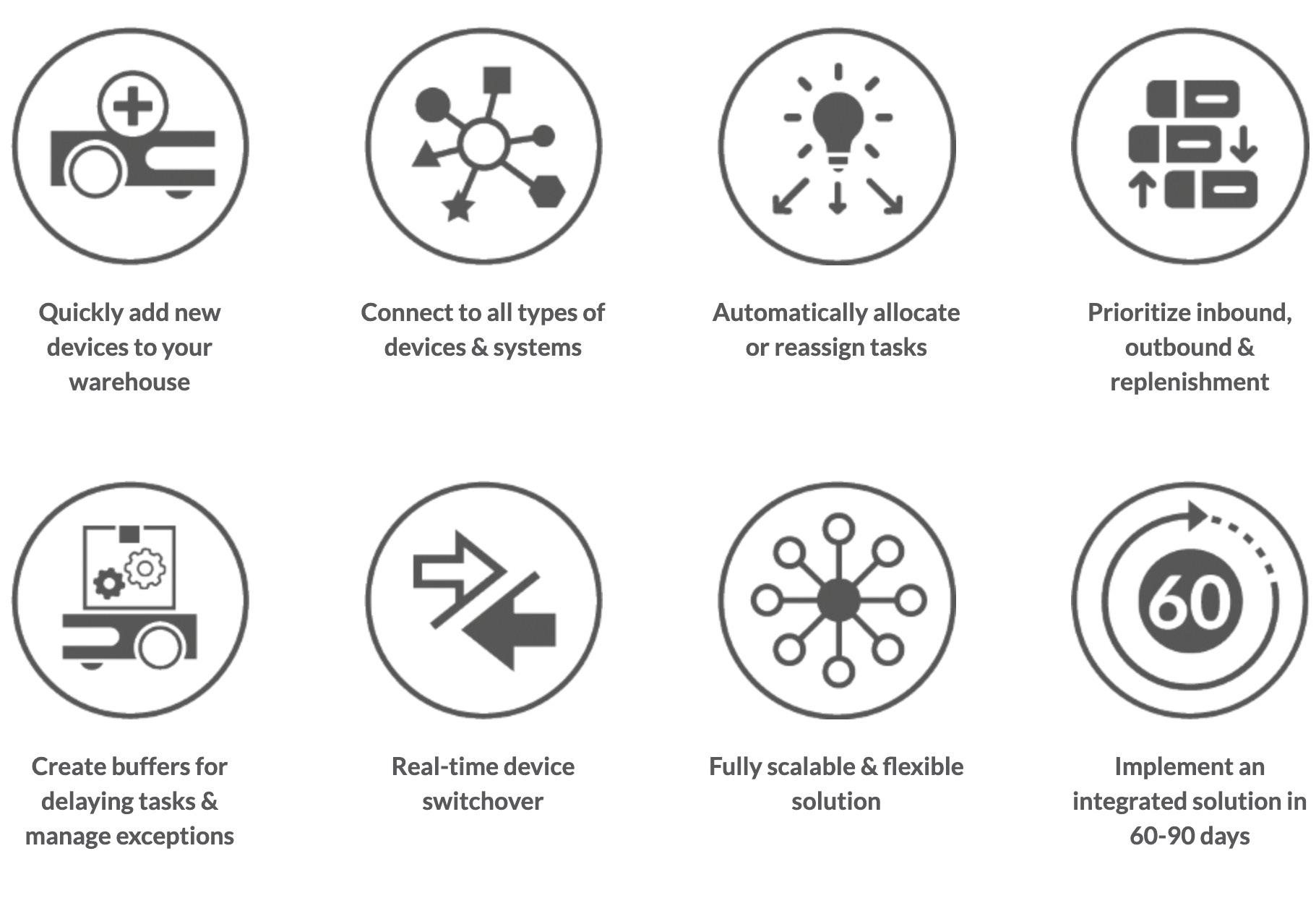
As businesses adopt new technologies and automation to mitigate labor challenges and make warehouses more efficient, the ability to rapidly integrate and operate these investments is critical.
SnapControl extends the functionality of the robust and flexible rules engine in the Tier 1 WMS solution SnapFulfil. It is a device agnostic multiagent orchestration platform that provides you with seamless and efficient control of all warehouse devices and robots, with a low total cost of ownership and rapid time to value.
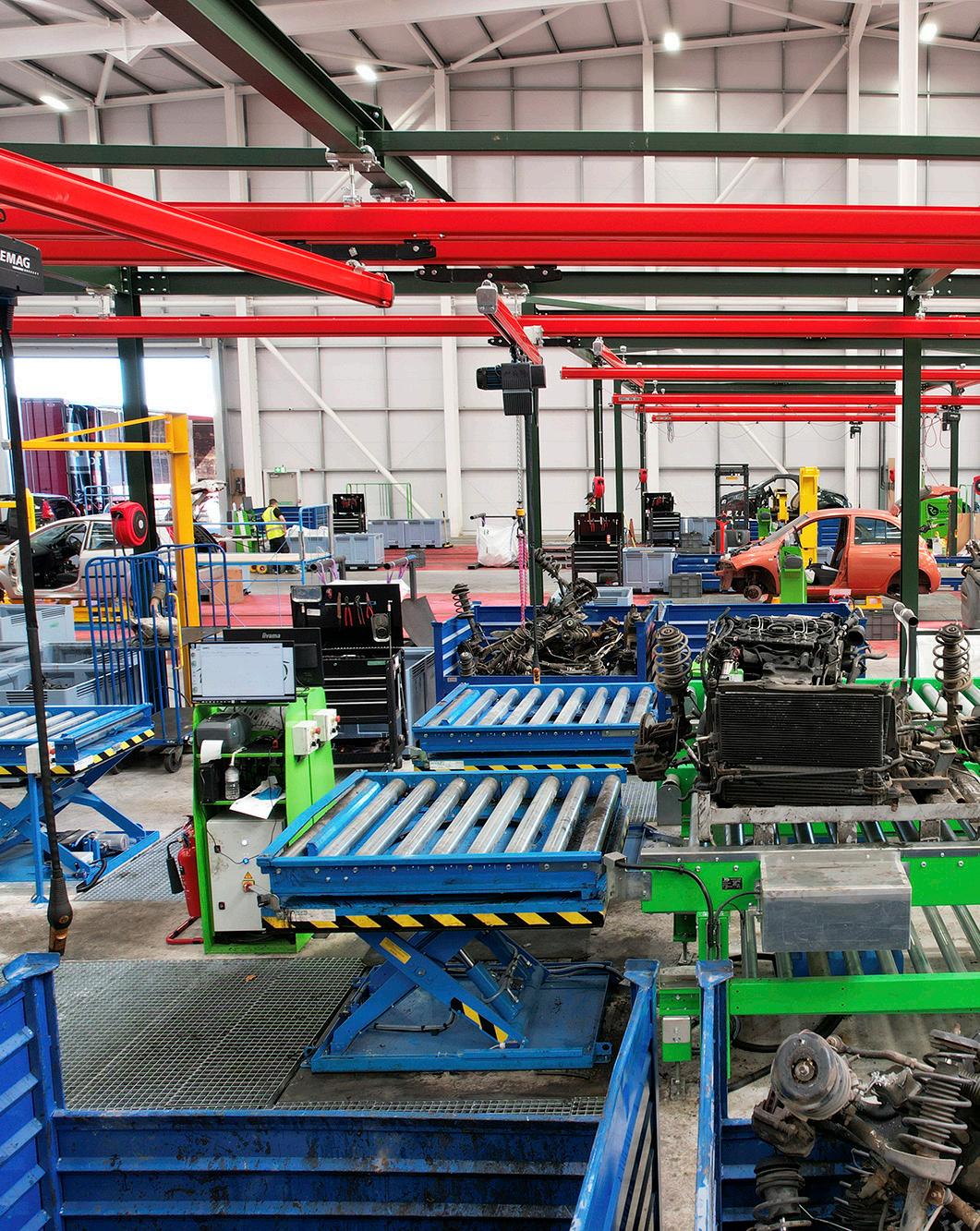
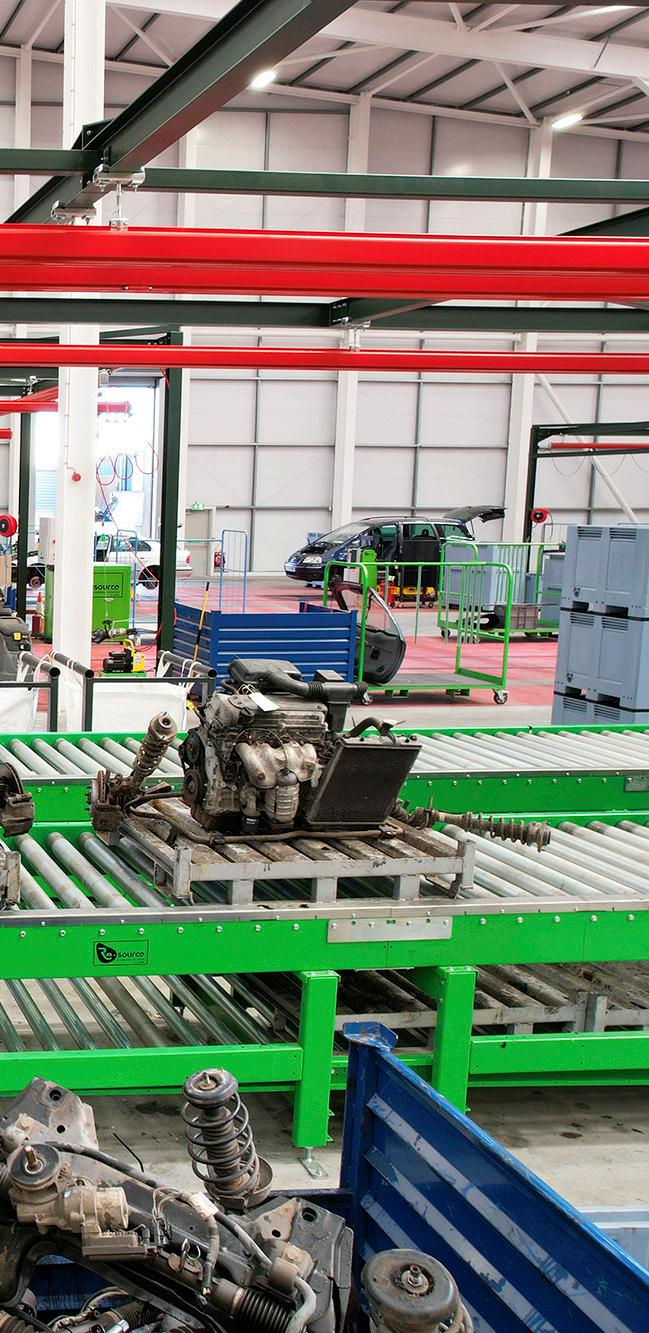
The implementation of Snapfulfil’s WMS is set to transform Charles Trent Ltd’s operations in several ways. First, the system will automate many manual processes, reducing the potential for errors and speeding up the handling of vehicles and parts. This automation will also enhance the accuracy of inventory tracking, ensuring that parts are readily available when needed.
Additionally, Snapfulfil’s real-time data capabilities will provide Charles Trent Ltd with actionable insights into their operations, enabling better decision-making and more agile responses to market demands. The improved efficiency is expected to result in faster turnaround times for customers and a more streamlined recycling process.
Industry expert James Collins highlighted the impact of such technological advancements: “Charles Trent Ltd’s adoption of Snapfulfil’s WMS is a significant move in the automotive recycling sector. The integration of advanced warehouse management technology will not only boost operational efficiency but also set a new standard for how companies in this industry manage their supply chains and inventory.”
Sustainability remains a core value for Charles Trent Ltd, and the new technological integration with Snapfulfil supports this commitment. By enhancing operational efficiency and reducing waste, the partnership aligns with the company’s goal of minimizing its environmental impact.
David Trent emphasized the importance of sustainability in their operations: “Our dedication to environmental responsibility is at the heart of everything we do. The efficiencies gained through Snapfulfil’s technology will help us further reduce our carbon footprint and improve our overall sustainability practices. We are excited about the positive impact this will have on our operations and the environment.”
Looking ahead, Charles Trent Ltd is poised to leverage its new technological capabilities to explore new market opportunities and expand its service offerings. The partnership with Snapfulfil is just one aspect of a broader strategy to position the company as a leader in the global automotive recycling industry.
David Trent expressed his optimism about the future: “We are embarking on a transformative journey with Snapfulfil, and we are confident that this partnership will unlock new levels of efficiency and innovation for us. Our goal is to continue leading the industry in both technological advancement and environmental stewardship, ensuring that we deliver exceptional value to our customers and contribute positively to the industry.”
Charles Trent Ltd’s strategic partnership with Snapfulfil marks a significant milestone in the company’s evolution. By integrating advanced warehouse management technology, Charles Trent is setting new standards for efficiency and operational excellence in the automotive recycling industry. As the company embraces this new era of innovation, it is well-positioned to enhance its service offerings, drive sustainable practices, and lead the way in the global market.
www.trents.co.uk
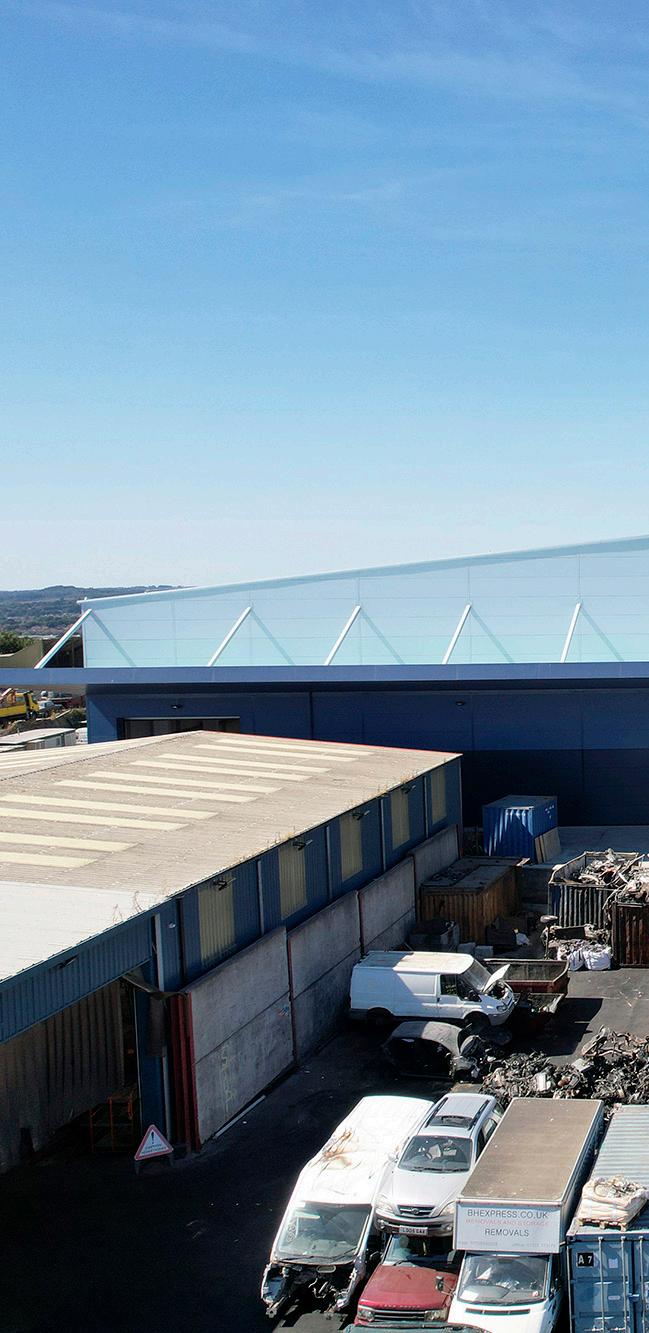

Founded in 1964, Charles Trent Ltd is a leading UK-based automotive recycling and vehicle dismantling company. Committed to sustainability and operational excellence, the company provides high-quality recycling services and is dedicated to reducing its environmental impact through innovative practices.
Snapfulfil is a leading provider of cloud-based warehouse management systems (WMS) based in the UK. Known for its innovative technology and expertise in optimizing warehouse operations, Snapfulfil offers solutions that enhance efficiency, accuracy, and productivity in supply chain management.
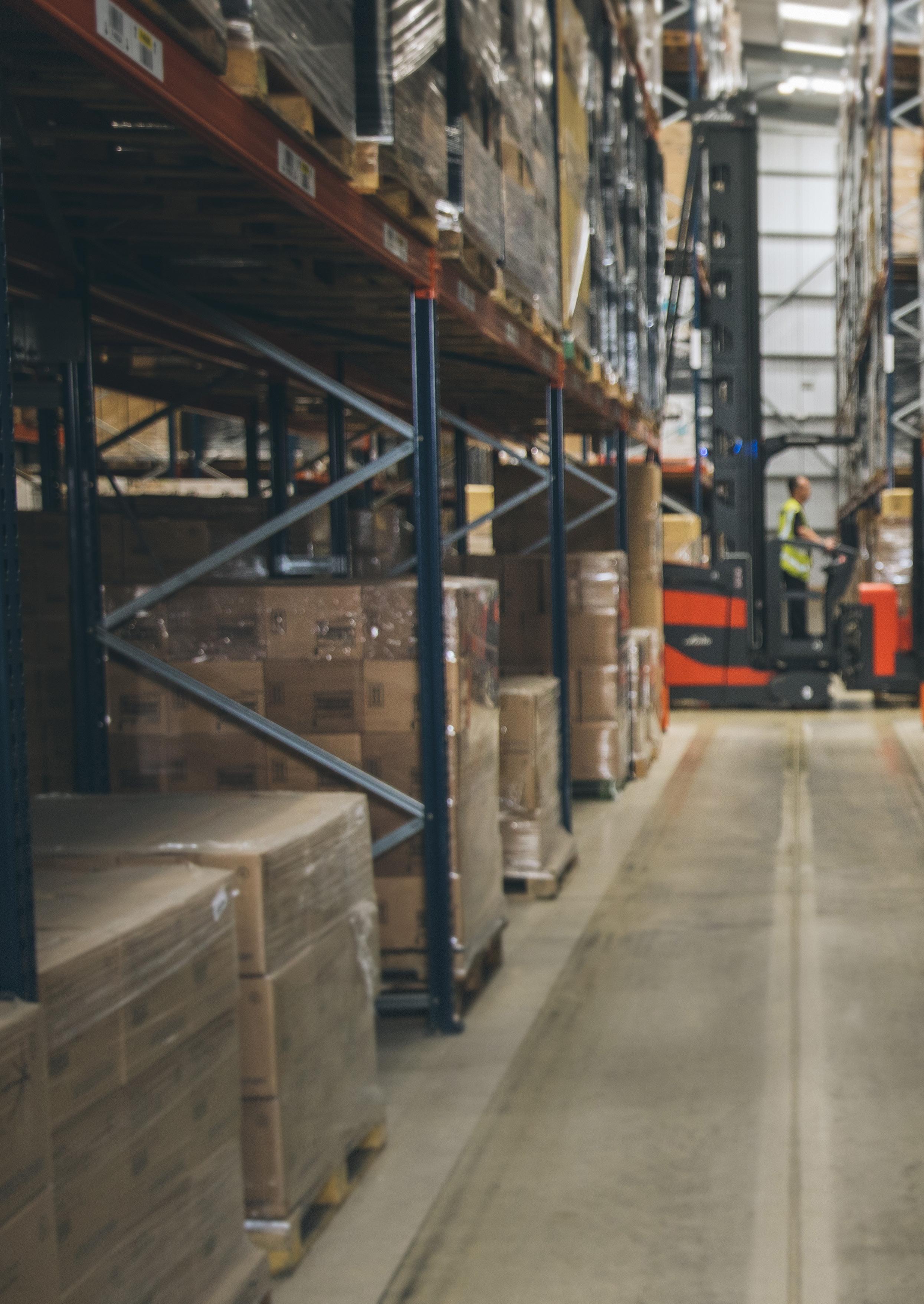
Providing a suite of warehouse management systems, Synergy Logistics has become synonymous as a leader within its space.

SNAPFULFIL
PROJECT
DIRECTED BY: JAMIE WAITE
ARTICLE WRITTEN BY: LAURA WATLING
For more than 50 years, its technology has powered the warehousing operations of some of the world’s most successful companies, such as 3PL, Huhtumaki, SSE, and Vax.
Within Synergy Logistics’ portfolio of solutions, SnapFulfil is a cloud-based, Tier 1 warehouse management system (WMS) with flexibility at its core.
Keeping customer’s needs at the heart of its strategy, SnapFulfil delivers cutting edge technology at a fraction of the cost of traditional installations, saves valuable down-time, offers a rapid return on investment, and evolves to meet the ever-changing demand of warehousing and logistics needs.

SnapFulfil enables its variety of customers to implement automated, system driven fulfilment into their warehouses, reducing errors and enhancing order accuracy. In addition, SnapFulfil’s technology enables faster order processing and offers a flexible rules engine to assist its customers in using the WMS to its full potential.
Chief Product and Delivery Officer for SnapFulfil, Smitha Raphael, discussed with Business Enquirer the many benefits of implementing SnapFulfil into your fulfilment centre. Why should businesses implement automated, system-driven fulfilment?
“The greatest gain from transitioning away from a manual paper picking process to an automated, system-driven solution is efficiency, which ultimately saves businesses money,” explains Smitha.
The software integrates with Enterprise Resource Planning (ERP) systems, shopping carts, carriers and more, updating inventory and order status information in real time and providing a ‘single version of the truth’ across all critical business systems and sales channels.
“SnapFulfil’s accurate reporting allows staff to view their low stock versus their order level, as well as monitor seasonal trends. In turn, this prevents back orders and order cancellations, improving customer perception and satisfaction,” shared Smitha.
SnapFulfil’s implementation into Vax saw the appliance manufacturer realise a wide range of improvements across its omnichannel business.
In line with its objectives, the company required a WMS which could be implemented efficiently without substantial IT resource requirements, had simple interfacing capabilities and which didn’t require a significant capital outlay.
Amongst the results, it saw an increased number of despatches with no increase in labour and decreased indirect costs



resulting from pick errors and product returns. In turn, this improved customer service across all channels.
It also found improved space utilisation and improved inventory control, including goods received pallet identification and shipping container management.
The impact of the implementation of SnapFulfil into Vax has also provided the business with scalability for future business growth.
Further, SnapFulfil’s WMS allows for barcode verification, ultimately leaving no margin for error. The solution triggers inventory audits, offers packing and shipping station verification, and provides cycle counts whilst picking.
“Our software reduces the need for inventory related down-time,” added Smitha. With Smitha and her team continually evolving SnapFulfil to meet
customer’s requirements, new features are frequently being added.
“Additionally, our WMS can integrate with warehouse robotics. SnapFulfil effectively works alongside Synergy Logistics’ SnapControl, a multiagent orchestration platform (MAO) that provides a device agnostic, unified approach to automation. The sky really is the limit with our solutions,” said Smitha.
A key strength of implementing SnapFulfil into a warehouse is its “order grouping” functionality, which can be set to different picking rules to increase efficiency.
“Our WMS also integrates automatic label printing which can be done at the end of picking or packing to suit the business needs,” explained Smitha.
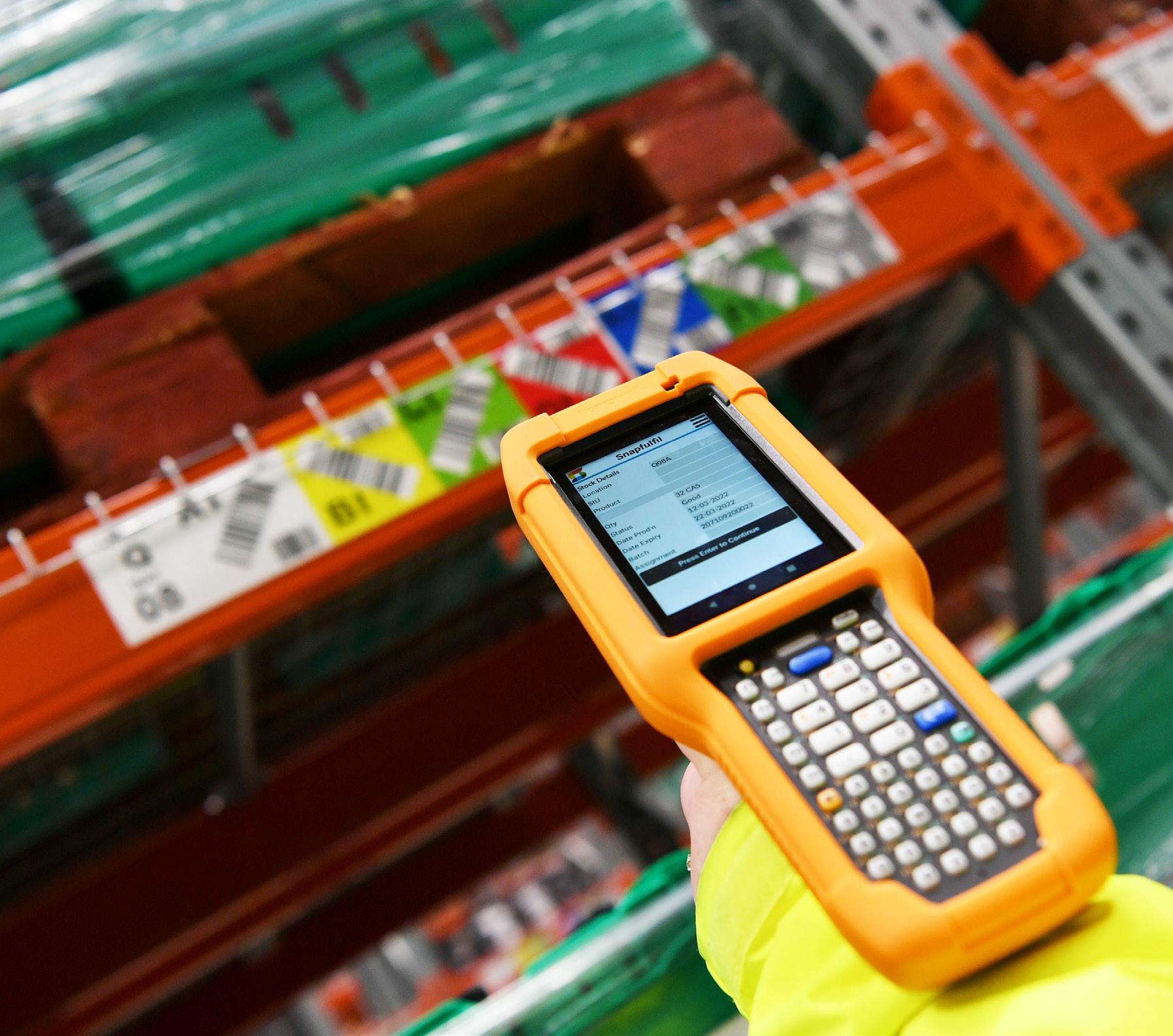


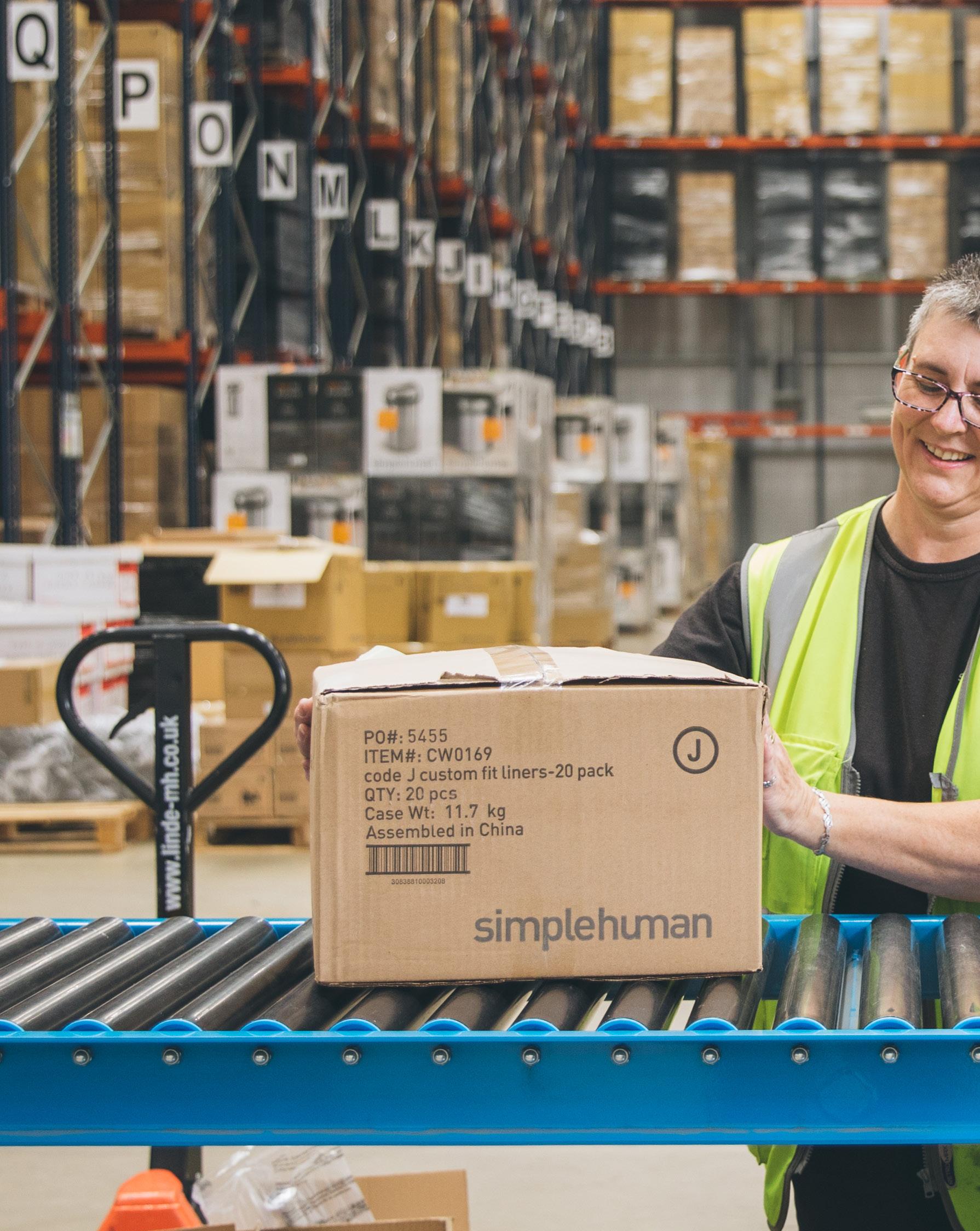

Working with SnapFulfil’s team, Moran Logistics, experts in multi-temperature controlled transport and warehousing, saw almost immediate results after a swift three week implementation.
With multiple picking and packing options made available to the logistics firm, production output quickly and efficiently ramped up four-fold, from an initial 10,000 cases per day to around 40,000. Now well embedded into Moran Logistics’ operations, it has experienced a further increase to between 75-88,000 cases in a 24-hour period.
“A key focus for our Product Development is ensuring that our product is flexible for our customers, no matter their operation,” shared Smitha, “We work closely across the business, with the Support team, Delivery team, Account Management and Customer Success, to ensure our customers feedback is actioned and that we are successfully meeting their individual needs and expectations.”
SnapFulfil’s innovative technology and customer-centred approach to software integration has seen Synergy Logistics positioned in the Gartner® Magic Quadrant™ for WMS for the 12th year (May 2024).
Of the eight “niche” vendors identified for 2024, Synergy Logistics was the closest towards the ‘visionary’ quadrant axis. Its robust and flexible rules engine, which allows for high levels of noncode adaptability to support customerspecific and vertical-industry-specific requirements was highlighted.
“The recognition from Gartner adds further authority to SnapFulfil and demonstrates our ongoing commitment to deliver a technologically advanced system where customers can enjoy swift
and agile deployment, and a rapid return on investment,” said Smitha.
But whilst industry recognition such as being listed within Inbound Logistics’ Top 100 IT Providers, and Technical Project Manager (Synergy North America Inc.), Charles Thompson, being named a winner in Supply & Demand Chain Executive’s 2024 Pros to Know award, the proof of SnapFulfil’s success is in its customer’s numbers.
The 43-day implementation and integration of SnapFulfil with The Topps Company’s (known for its series of trading cards) Oracle ERP has led to a significant increase in operational efficiency, with its five operatives more than doubling its shipping from 500 orders per day to between 1,200-1,800 orders per day.
Considered one of the most successful projects completed by Topps, it also saw the business save $200,000 in the first quarter of SnapFulfil’s integration.
Additionally, as a direct result of implementing SnapFulfil, energy company SSE experienced immediate and significant efficiency improvements, which included order fulfilment improving from less than 90% to more than 98%, pick lines per hour per full time employee increasing from 13 to 19 and staffing levels reducing by 15%.
“There are a number of steps I believe businesses in the fulfilment industry should be taking to improve their operational efficiency and OpEx, this includes prompt order delivery, inventory accuracy and real-time visibility, and automation. SnapFulfil is proven to support businesses in all of these areas and we will continue to develop the software to meet ever-changing needs,” finalised Smitha.
www.snapfulfil.com
www.synergy-logistics.com
Positioned as a challenger in the sector, Pétro Ivoire ranks third in national fuel sales (following Total Côte d'Ivoire and Vivo Energy Côte d'Ivoire) with a market share of 12%, and ranks first in the gas segment with a market share of 32%.
"Pétro Ivoire is one of the flagships of the Ivorian economy, positioning itself as the Ivorian leader or pioneer among Ivorian companies in the oil and gas product distribution sector, which was initially dominated by multinationals," shared Managing Director Sébastien KadioMorokro.
Throughout its 30 year history, the business has achieved several major milestones, including the substantial development of its network to over 90 service stations.
Within its network, Pétro Ivoire has continued to expand by diversifying with its ChezNou boutiques, a place where visitors can relax as well as purchase basic necessities and promote products ‘Made In Côte d’Ivoire’, Additionally, its network includes Pétro Ivoire’s
Distributing Petroleum products, derivatives and services in Côte d'Ivoire, Pétro Ivoire is celebrating its third decade in business in 2024.
POINT S network of specialised vehicle maintenance centres.
Recently, the business also launched its first rapid electric vehicle charging station, reinforcing its commitment to the climate and the environment.
With Sebastien leading the business since 2010, the business has identified four major commitments: Ensure the human and professional development of men and women; Being an innovative, loyal and responsible company; Contribute to the development of our communities; and contributing to the climate and environment
Reflecting its commitment to climate and environment, Pétro Ivoire is making

PÉTRO IVOIRE
PROJECT DIRECTED BY: ADEL MHIRI
ARTICLE WRITTEN BY: LAURA WATLING







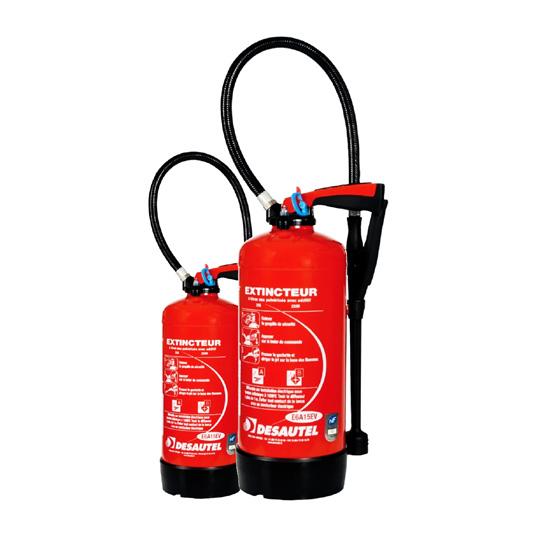
Since 1964, we’ve specialized in petroleum and industrial maintenance in Côted’Ivoire. Our expertise spans petroleum, fire protection, energy (generators, compressors, workshop equipment), hoses, and geolocation. Our dedicated departments ensure the optimal performance and reliability of your equipment. Trust our recognized expertise to enhance productivity and ensure seamless operation.


Since its establishment in 1964, Compagnie Côte Ivoirienne pour Tous Appareillages Mécaniques (COCITAM) has stood as a pillar in the petroleum and industrial sectors of Côte d'Ivoire. With a solid reputation for excellence, COCITAM specializes in providing top-tier maintenance services that ensure the optimal performance and reliability of a wide range of industrial nd petroleum equipment. The company's longstanding commitment to quality, safety, and customer satisfaction has earned it a position of trust and respect in the industry, exemplified by its enduring partnership with Petro Ivoire.
COCITAM’s expertise lies in the distribution, installation, and maintenance of both petroleum and industrial equipment. The company handles a comprehensive array of petroleum equipment, including fuel dispensers, pumps, POS systems, gauges, management terminals, tanks, and centrifuges. On the industrial side, COCITAM provides and maintains essential equipment such as fire protection systems, generators, air compressors, lighting, and hoses. While the scope of COCITAM's operations is broad, its primary focus remains on maintenance—a crucial element that underpins all of its activities. This focus on maintenance enables COCITAM to ensure that equipment not only functions efficiently but also has an extended operational lifespan.
At the heart of COCITAM’s service offering is its comprehensive maintenance programs. Preventive maintenance is designed to avert potential equipment failures, thus minimizing downtime and extending the lifespan of equipment. On the other hand, the company’s corrective maintenance services ensure that any issues are addressed swiftly and effectively, minimizing disruptions to operations.
Diagnostic Services:
Utilizing state-of-the-art diagnostic tools and technologies, COCITAM conducts thorough assessments to detect and diagnose potential issues before they become critical. This proactive approach helps in maintaining optimal performance and avoiding costly breakdowns.
COCITAM provides specialized maintenance services for petroleum distribution and metering equipment, ensuring that these critical systems operate smoothly and reliably. Regular maintenance of this infrastructure is vital for the safety and efficiency of petroleum operations.
Adhering to the highest standards of safety and performance is a top priority for COCITAM. The company conducts regular inspections and compliance testing to ensure that all equipment meets industry regulations and safety standards.
Understanding that each client’s needs are unique, COCITAM offers custom-engineered solutions designed to optimize industrial performance. This includes conducting feasibility studies to ensure the viability and efficiency of proposed systems.
COCITAM provides specialized training programs for operators and technicians, equipping them with the knowledge and skills needed to operate and maintain equipment safely and effectively.
The company offers consulting services aimed at improving mechanical and industrial processes, thereby enhancing overall operational efficiency.
COCITAM’s commitment to customer support is evident in its robust technical support services and well-stocked inventory of spare parts. This ensures that clients receive prompt assistance and can quickly replace defective components, reducing downtime.
robust of
COCITAM's success is built on a foundation of excellence, innovation, and customer-centric service. The company’s ability to deliver high-quality maintenance services and reliable equipment has made it a trusted partner in Côte d'Ivoire’s petroleum and industrial sectors. Its deep-rooted relationship with Petro Ivoire is a testament to its unwavering commitment to quality and customer satisfaction, which has remained the cornerstone of its operations for decades.

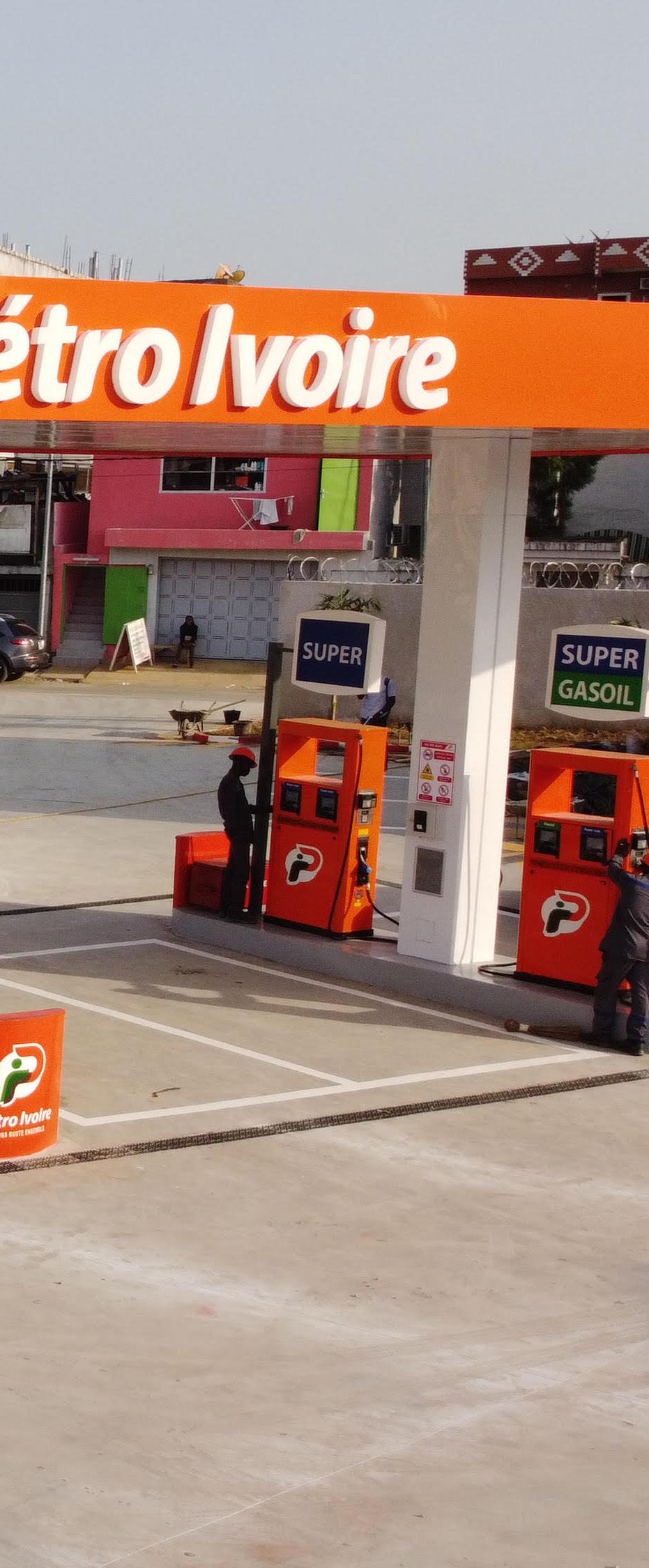
significant steps in preparing for the future of energy by investing in renewable energy and adopting innovative technologies such as electric vehicle charging stations.
“The inauguration of our first rapid electric vehicle charging station marks a turning point in our strategy to support the energy transition,” explained Sebastien.
Its EV charging station project represents the beginning of a larger deployment planned to meet the growing demand for sustainable mobility solutions.
“This initiative aligns with our commitment to sustainable practices, as evidenced by our triple ISO certification and CSR policy,” he added.
Furthering its commitment to the environment, Pétro Ivoire has launched several sustainability initiatives, such as implementing an energy-saving plan to reduce its carbon footprint and adopting rigorous environmental management practices.
“Our triple ISO 14001 certification reflects our commitment to environmentally friendly practices, and our CSR policy guides our approach to sustainability,” said Sebastein.
The business has been recognised by the Côte d'Ivoire government with the Hydrocarbons Sector Excellence Award, validating its leadership and commitment.
“This recognition complements our achievements in quality, sustainability, and safety, evidenced by our triple ISO certification,” commented Sebastien.
In 2024, the business holds ISO 9001, ISO 14001, and ISO 45001
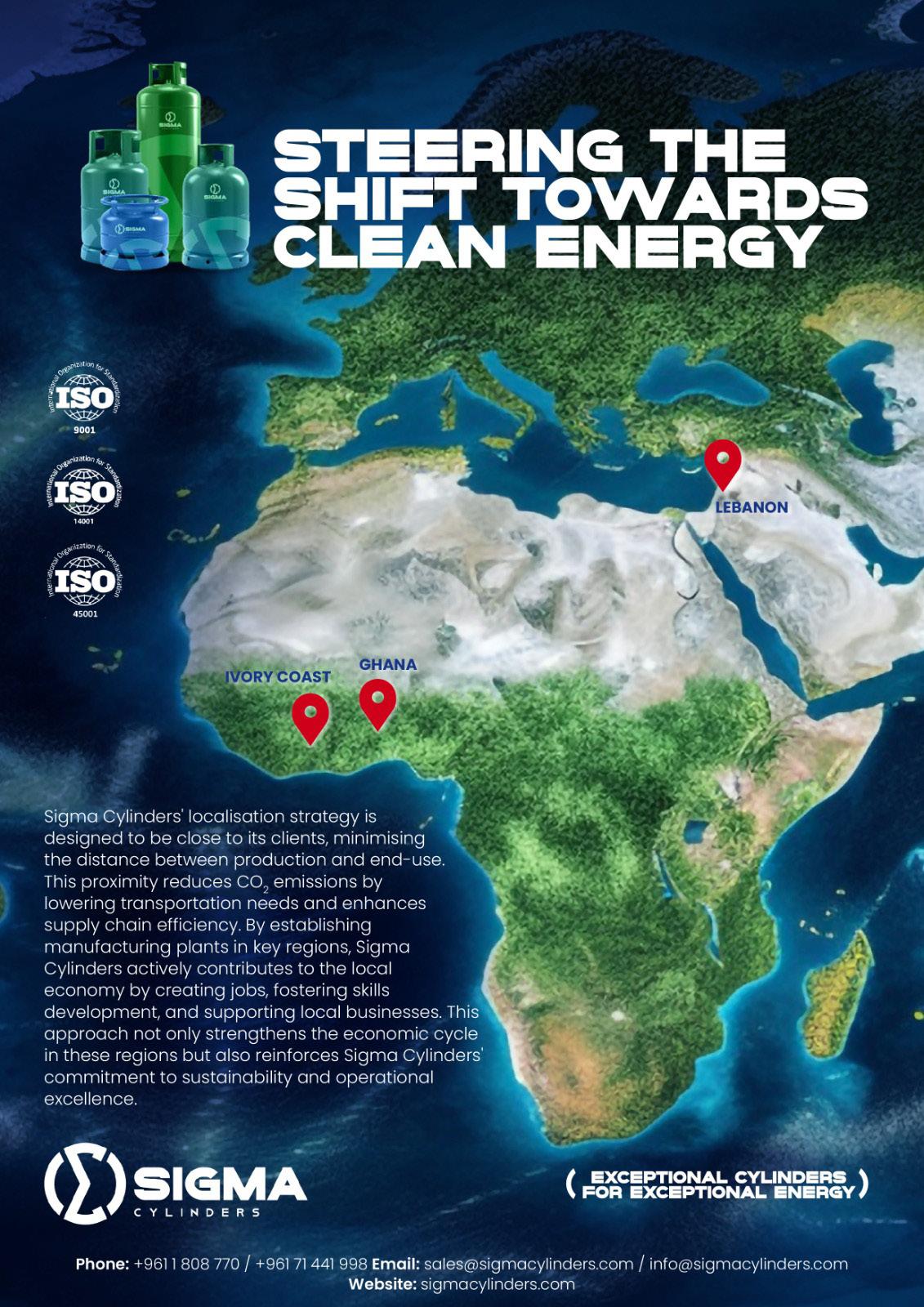


Being the reference in health coverage in Senegal and the region is an excellent backdrop that goes beyond the core of our business. Without ignoring the quality of the services offered, which remains the cornerstone of our existence, the pursuit of this vision motivates us daily to take into consideration the expectations of our stakeholders while remaining a fully responsible mutual company. Thus, Transvie is the health insurer of the entire informal non-agricultural sector and of more than one thousand five hundred (1,500) public and private companies, all sectors of activity combined. With the launch in 2021 of the pension fund intended to offer a retirement model in Africa, Transvie will fulfill its dream of being an almost perfect social protection
system, designed by Africans and for Africans. A brokerage firm is being launched to provide a greater response to the needs of our clients.
A workforce of more than 80 people made it possible to make the vision, the strategic direction, which consists of:
• Opening up more to public and private companies
• Implement new products
• Establish a strong territorial presence with 24 agencies and representations in Senegal and the sub-region
• Allow the diaspora to offer health insurance to their family remaining in Senegal
• Digitize premium payments
Directeur Général Groupe Mr. Abdou Diagne

Innovation always imposes itself on us, justifying our desire to “Be the Reference” in health insurance.
- HEALTH
- PROVISION
- MICRO ASSURANCE




Turnkey solutions to help businesses transition to electric mobility, lower their carbon footprint and reduce operating costs.
Fast and smart EV Chargers.
IOT platform for vehicle and charger management.
Driver-Centric app to accelerate adoption.
Ideal for taxi and ride-hailing.
Optimised for weak electrical grids.



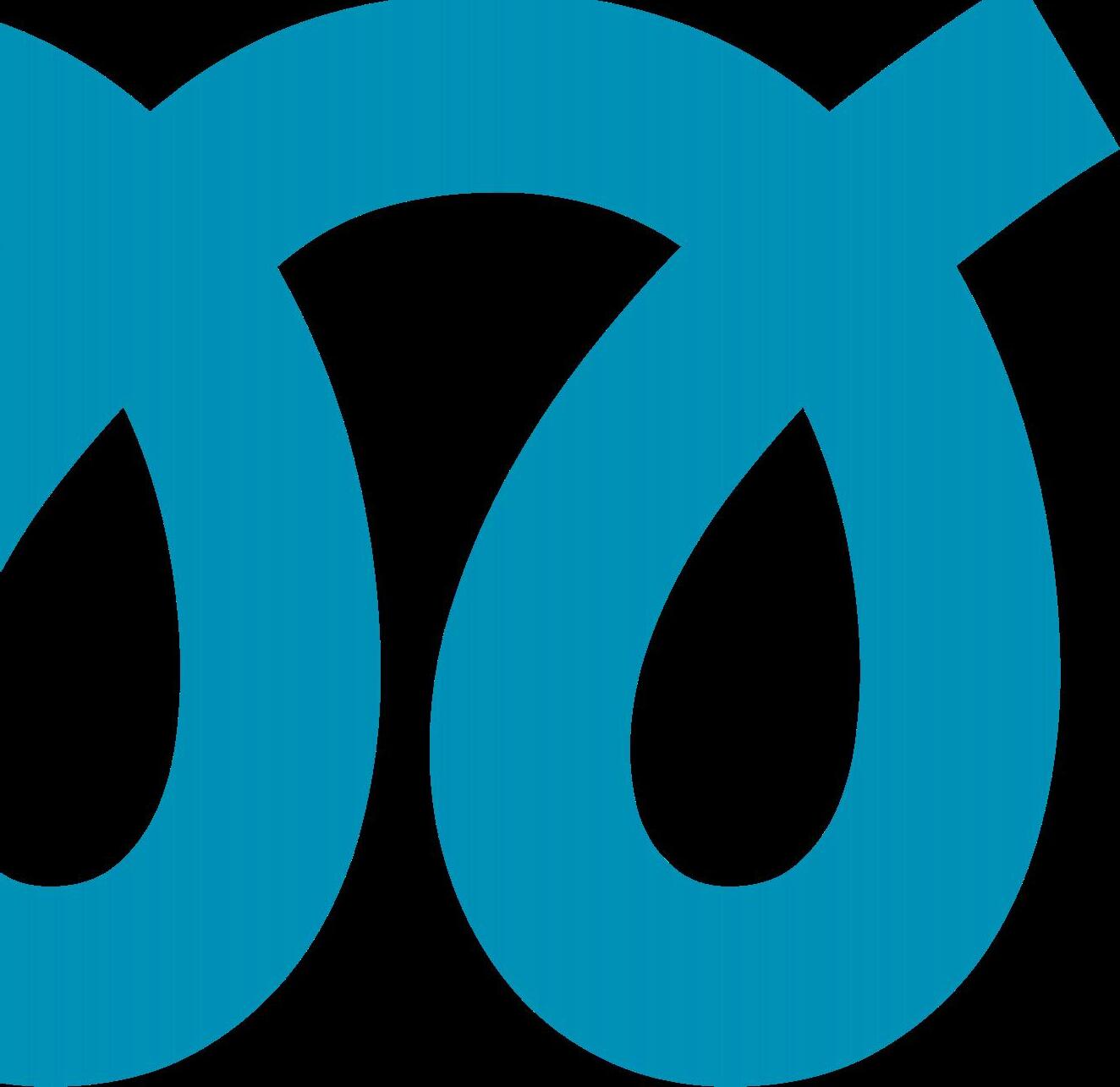

As the global EV market surges ahead in OECD countries, propelled by environmental concerns and government incentives, it’s easy to overlook the rising tide in emerging economies. But doing so would be a significant oversight.
With rapidly falling EV prices, driven by battery cost reductions achieved through large-scale manufacturing in China, the US, and Europe, the total cost of owning an electric vehicle can now be 25-50% lower than that of a fuel vehicle, particularly in many high-usage segments. On top of that, businesses transitioning to electric mobility can slash their carbon footprint by 50-90%, depending on the local energy mix. Yet, challenges remain in fully unlocking electric mobility’s potential—challenges that illigo is ready to tackle head-on.
1. Charging Infrastructure: Illigo offers a comprehensive solution to deploy, maintain, operate, and monetize EV chargers, even in areas with weak electrical grids, through our proprietary management software.

2. Financing: To ease the initial investment, illigo provides long-term rental options for electric cars, making the shift to electric more accessible.
3. Adoption: Our IoT platform seamlessly connects drivers to cars and chargers, enhancing the driving experience and allowing businesses to focus on their operations.
Join the electric mobility revolution with illigo. Whether you’re looking to reduce costs, cut your carbon footprint, or streamline your operations, we’ve got the solutions to power your journey.
Visit www.illigo.mobi to explore our offerings and see how we can accelerate your transition to electric mobility.
www.illigo.mobi

Since its inception, Pétro Ivoire has evolved significantly by diversifying its products and services, and adapting to market
As it moves into its next decade in business, its forecourt expansion strategy is based on a thorough analysis of market opportunities and the optimisation of its
“We aim to strengthen our presence in high-potential areas while maintaining high standards,” shared Sebastien.
In part, this standard is achieved by its continued focus on enhancing customer service. This has included the implementation of initiatives such as ongoing staff training, infrastructure improvements, and the adoption of digital solutions to facilitate transactions.


Internally, Pétro Ivoire has integrated digital tools for stock management, process automation, and customer data analysis, to improve efficiency and service.
From a customer perspective, the launch of the Pétro Ivoire app has further enhanced customer experience.
The application allows customers to search for the nearest Pétro Ivoire service station and check the available services. It also supports users in monitoring

transactions and budget via the LIBERTE Pétro Ivoire Card.
“We are a digitally oriented company, working to implement digital solutions that integrate the entire value chain,”
Sebastien said, “Digitisation plays a crucial role in improving our operations and customer service,”.
With Pétro Ivoire having such a significant impact on the economy in Côte d'Ivoire, Sebastien shared his thoughts for future entrepreneurs in the country, and beyond:
“I would advise aspiring entrepreneurs to focus on innovation, understand market needs, and aim for excellence by adopting responsible practices. Obtaining recognised certifications, like our triple ISO certification, and aligning strategies with a CSR policy are crucial for success in the energy sector. The Hydrocarbons Sector Excellence Award received by Pétro Ivoire exemplifies the impact that these practices can have on recognition and success”.
www.petroivoire.com
If there is one business that values evolution as a pathway to sustainable growth, it's Generali Group.
Founded in 1831 in Trieste, Italy, Generali Group is now one of the world’s largest insurance and asset management providers, serving 70 million customers across 50 countries.

GENERALI
PROJECT DIRECTED BY: JASON WESTGATE
ARTICLE WRITTEN BY: LAURA WATLING
The Group believes that not only acting in the current environment but also anticipating future trends as an insurer has been key to its sustainability.
Crossing over between the Now and the Future, Generali Group has been an early adopter of AI in insurance. To ensure its implementation is successfully onboarded with both customers and its 82,000 employees, Generali Group has developed a robust Trustworthy AI strategy.

Leading on this strategy is Group AI Governance Program Director, Alessandro Bonaita. Joining Generali Group in 2016 as Group Head of Business Analytics Solutions and with almost 20 years experience with AI in blue chip companies, Alessandro has been instrumental in shaping and implementing Generali Group’s AI Strategy.
Alessandro supports and oversees the AI strategy at global level, ensuring accountability and ethical use.
“Generali’s mission is to become a lifetime partner to its customers, so it’s key that we continually evolve and advance our procedures. Part of my role is ensuring this is happening within the realm of technology and AI,” he added.
Consistency is Key to Onboarding AI
“The challenge of developing and implementing an AI strategy in an international group such as Generali is the complexities of differing regulations across countries. And it is key for our business that we have a clear and consistent strategy across all of our representatives,” shared Alessandro.
To ensure clarity, Generali’s AI strategy follows three pillars:
End to End Automation - driving cost savings and revenue growth whilst simplifying customer interaction;
• Technical Convergence - with a central digital factory of 40 AI assets; And Data Literature.
Crucially, its Data Literature pillar ensures a global approach to upskilling employees. “To promote appropriate application of our responsible approach to AI, we train all of our colleagues to know our key principles and to recognise ethical dilemmas related to new technologies,” explained Alessandro.






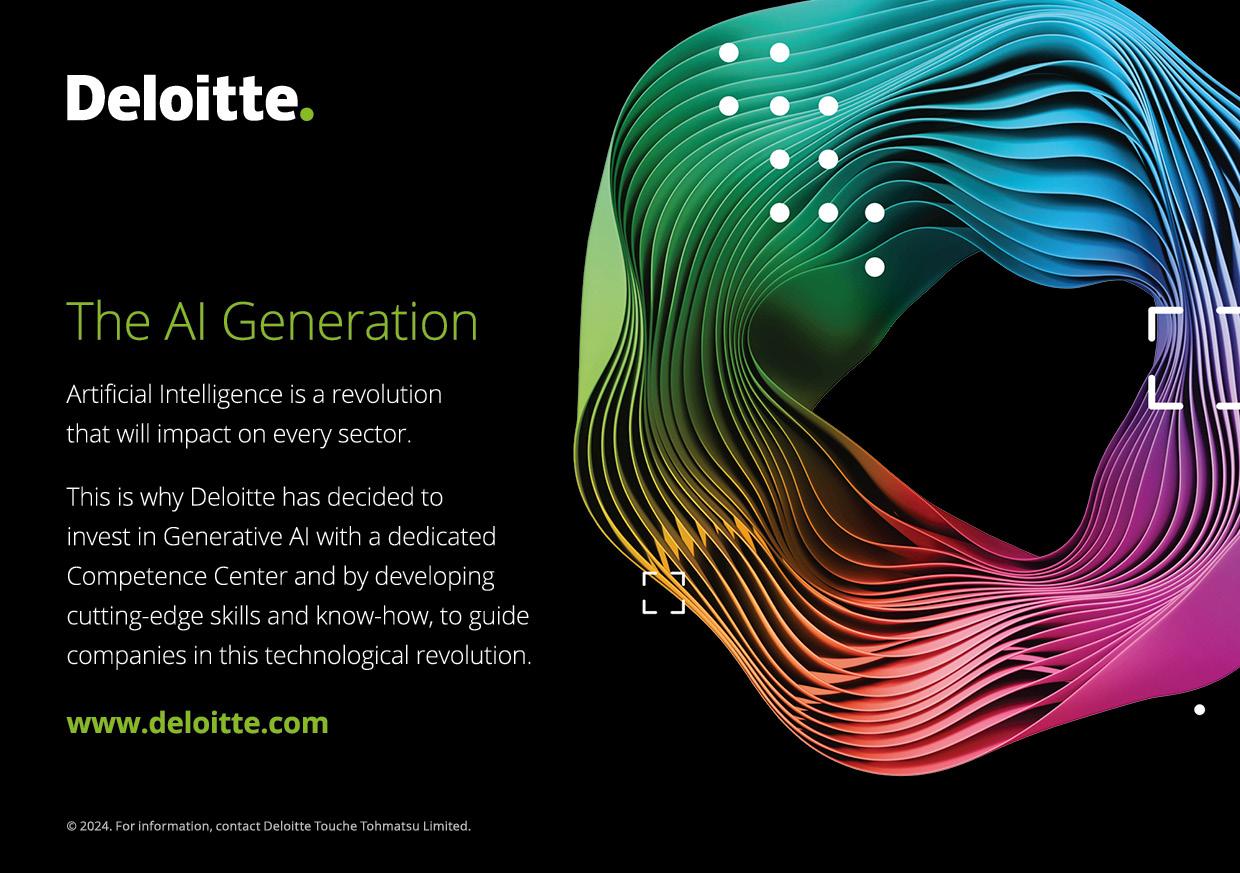

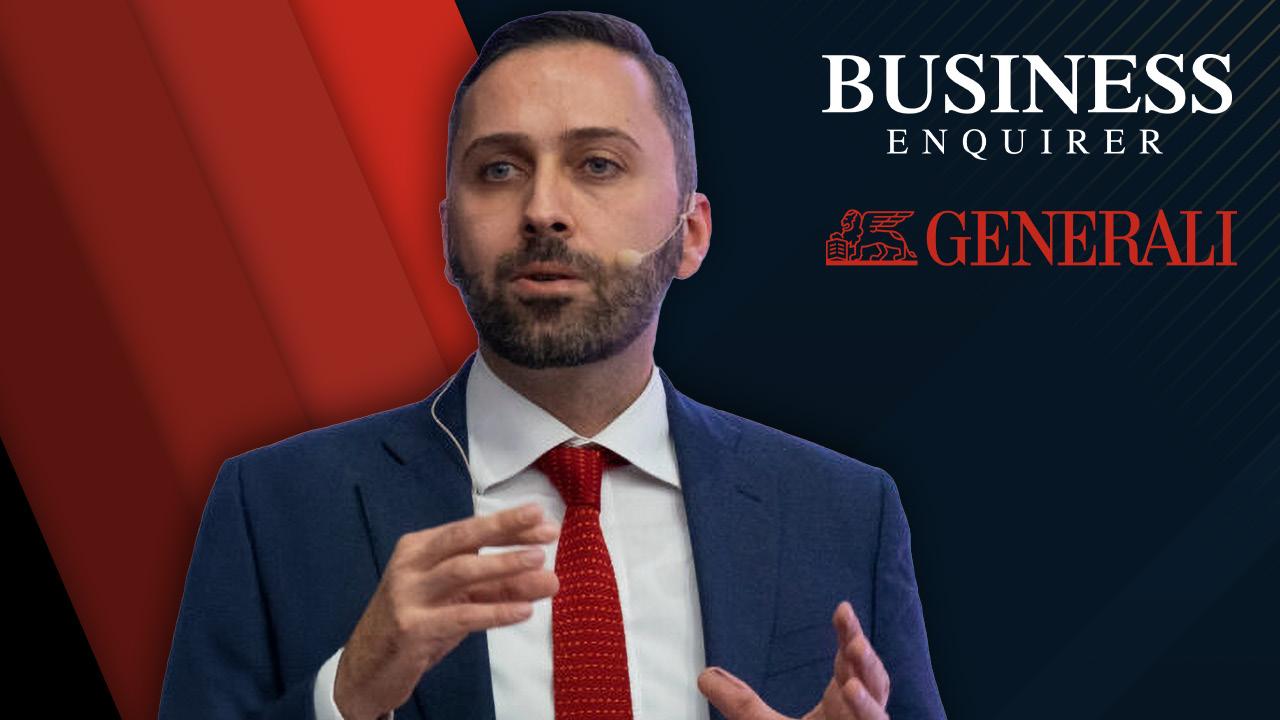



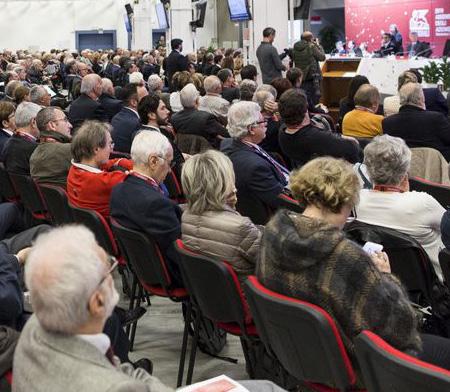
Through its We LEARN Program, the Group-wide upskilling initiative launched in 2019, Generali continues to equip its people with the cutting-edge business, digital, and behavioural skills to drive growth and enhance customer service. Not only does the programme uplift the implementation of AI and the service it provides customers (reinforcing its goal of becoming a lifetime partner), but it also assists in unlocking new job opportunities for employees.
Important to the successful implementation and governance of AI within a global organisation such as Generali, Alessandro says, is collaboration.
“From the start, we have ensured that AI values our people, by guaranteeing human oversight on digital technologies and implementing sound governance mechanisms in order to mitigate operational risks related to the use of data and algorithms,” explained Alessandro.
This has required a homogenous approach across the business, no matter the department.
Backed by its We LEARN programme, Alessandro believes behaviour change has been successful, and integration of AI within the business has been received positively.
Being ahead of the curve with AI implementation has also proved beneficial for Generali.
“As we move well ahead of our sector when it comes to AI, it means we can properly adapt our processes to the constantly-evolving scenario, operating according to best practices for our customers and for our colleagues ,” he added.
Whilst early insurance contracts date back to the 1300s, modern-day innovations such as AI have a valuable place in this ever-evolving industry.
Developed in order to improve customer onboarding, engagement, and retention, as well as enhancing the services Generali can offer, Alessandro highlighted several opportunities for implementation.
“For example, when underwriting policies, we can use satellite imagery to understand risk factors to a property,” he explained, “this makes the process more efficient for both colleagues and customers, whilst driving financial optimisation, one of Generali’s overarching key pillars”.
Generali is also investing in improving generative AI to ensure it is both friendlier and more specific, again enhancing customer experience.
“The availability of new data sources unlocks further potential cross selling opportunities, with AI tools providing valuable strategic support,” explained Alessandro.
In its current investment cycle, Generali Group has committed €1.1billion to digital technology, 60% more than its last investment cycle. It has also created a €250 million tech investment program to harness high-potential opportunities.
“Ensuring our colleagues across the business feel empowered to play a role in AI advancement, we have also launched our internal innovation fund, which aims to accelerate innovation within the group at global level,” added Alessandro.
Recognised by the industry, Generali was honoured at the Qorus Innovation in Insurance Awards 2024.
For the fourth year in a row, Generali innovation projects were shortlisted as finalists by Qorus, winning one gold and


one silver, marking a new achievement in Generali’s innovation journey.
Highlighting its Innovation Fund, Generali won gold in Qorus’ Social, Sustainable & Responsible category for Generali Protect Me. Developed by Generali Deutschland and co-funded by the Innovation Fund, Generali Protect Me is an extreme weather app, which enables users to receive customised alerts for their selected locations and driving routes, providing them with early warnings, real-time notifications, and preventive advice to tackle potential risks ahead of time.
Additionally, Generali received the silver in Qorus’ Workforce Transformation category for its Executive Master Programme “Futuro Agente”. This programme has been developed through collaborations with leading Italian business schools, providing Generali agents with extensive business management training.
“This programme emphasises developing entrepreneurial skills through a blend of in-person and online learning, providing a customised educational experience aimed at cultivating a future generation of professionals sharing Generali's vision,” explained Alessandro.
The recognition of Generali’s commitment to and drive of innovation sees the insurance firm continuing to position itself at the frontier of innovation.
With AI-related innovation continuing to play a key role in Generali’s vision to drive sustainable growth, deliver strong earnings, and being recognised as a leader in the field of AI, Alessandro highlighted that integrating responsible AI into Generali’s ESG framework will be vital to its growth strategy.
“We must continue to reinforce Generali’s commitment to the ethical use of AI, which we have highlighted in our Trustworthy AI strategy, to strengthen our position of trust with our customers and create sustainable growth,” said Alessandro.
www.generali.com
Since the firm was featured in Business Enquirer in September 2023, in which the publication highlighted AngloGold Ashanti’s ten-year socio-economic development plan (SEDP) for its Obuasi mine, the mine has taken major steps forward in its redevelopment.
Currently, AngloGold Ashanti operates 12 mines across Africa, The Americas, and Australia.
Production at Obuasi, an underground mine in Ghana’s Ashanti region, began in 1987 and stopped in 2014. A favourable feasibility study was completed in 2017 and indicated a strong technical and economic case with an anticipated 20year life of mine.
Further to this, approval was received from the AngloGold Ashanti Board to proceed with its redevelopment project in 2018.
The redevelopment project began in early 2019 and first gold was poured during the Q4 of that year.

PROJECT DIRECTED BY: GARY SMITH
ARTICLE WRITTEN BY: LAURA WATLING


We focus on providing our clients with g game-changing solutions that are both useful and practical for water, waste, and energy management.
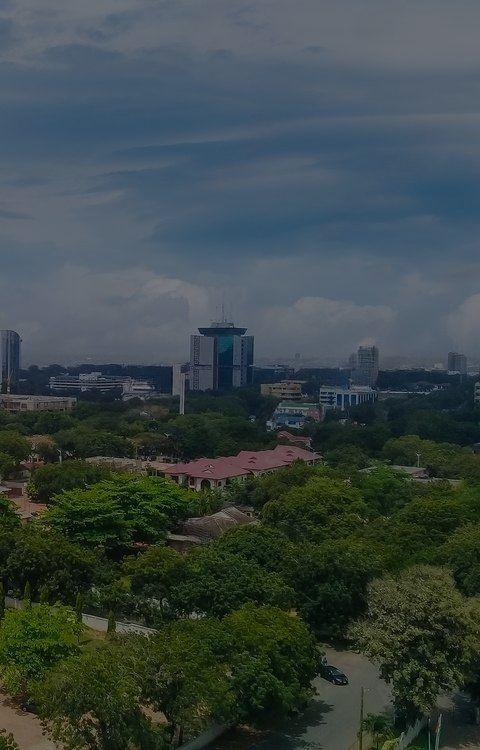
1ST QUARTER 2024 BEST CONTRACTOR AWARDED BY ANGLOGOLD ASHANTI
HEALTH AND SAFETY
MAN HOURS, LTI FREE SINCE 2019 1.8M+
7 WATER PLANTS MANAGED, INCLUDING 2 DRINKING WATER PRODUCTION PLANTS AND 5 INDUSTRIAL EFFLUENT TREATMENT PLANTS

1,920,200 ㎥ OF DRINKING WATER PRODUCED FOR 10 COMMUNITIES IN OBUASI MUNICIPALITY IN 2023

6,941,004 ㎥ OF INDUSTRIAL EFFLUENTS TREATED IN 2023
www.africa.veolia.com
Veolia is the world leader in environmental solutions for the mining and metals market including water management, wastewater, industrial cleaning, resource recovery, and energy services. Veolia is present in all 6 continents with almost one billion revenue in the mining and metals sector.
We work with more than 100 mining sites worldwide and while we operate at the highest level of health & safety, we help mining companies reconcile business productivity and environmental sustainability from:
• Regenerating resources such as fresh water and managing wastewater and residues;
• Depolluting mining industrial processes thanks to hazardous waste and pollutants treatment;
• Decarbonizing the activities of the mine.
We go beyond our portfolio of service offer and design fit-for-purpose sustainable services in accordance with industry needs. A current priority is to grow long-term water management service contracts with the mining industry and develop our activities in waste and hazardous waste management at mines, including mercury or other residues without creating an environmental legacy at the site. Veolia also began to work with mines to identify sustainable energy alternatives, such as biomass towards improved carbon footprint ambitions. At the Veolia Group level, we target the elimination of 18 million metric tons of CO2 emissions by 2027. We aim to reduce GHG emissions by 90% by 2050 (compared to 2021, 35.4Mt emissions) and neutralize residual emissions. When we focus on West Africa, there is a positive water balance for most mines, unlike other regions where there is a water deficit. What this means for miners is that they must remove contaminants from the water before releasing it into the environment, in compliance with the EPA regulations. Veolia is addressing these challenges in Ghana for instance, where our current industrial services are mostly directed to mines and relate to water and salt management.
The mining industry consistently faces the challenge of increasingly scarce resources and environmental responsibility.
As the grade and quality of deposits decline, the mining industry is forced to use more resources to extract the same amount of ore. Water, energy, and waste management combine to form a significant expense line for mines, which are often located in remote areas and where the waste generated is potentially hazardous.
In addition, stricter environmental regulations and increased public pressure make it difficult for mining companies to maintain their operating permits. They need to develop strategies to limit their exposure to risks and implement best practices to cut clean-up costs. It is also by reducing the impact of mining on land and the environment, and by improving cooperation with local communities, that mining industries can ensure sustainable acceptability and therefore the productivity of their business.
As such:
• We improve productivity by treating water for production process requirements;
• We manage environmental risks by treating contaminated water to achieve water quality suitable for reuse or safe discharge into the environment;
• We seek to add value to the bottom line by treating sludge streams to recover suspended and dissolved constituents;
• We secure high-quality drinking water, even at remote mining sites;
• We have robust and reliable equipment requiring minimal unplanned maintenance; We cope with production peaks while complying with stringent regulations; We guarantee long-term efficiency and cost control through operations services.
Our solutions to combine productivity and responsibility Thanks to our understanding of the unique requirements of mine operations and our worldwide expertise in mine water issues, we focus on system performance, environmental requirements, and long-term cost-effectiveness to meet the demanding reliability, safety, and quality standards of the mining industry.
We Deliver Value in Many Ways
• Improving operational cost-efficiency;
• Improving yield to support competitiveness;
• Securing the license to operate;
• Responsibly planning for Closure.
Benefits to the Mine
• Circular economy from the mine effluent with by-products recovery at various stages of the process. This mitigates the environmental risks as well as generates long-term local jobs for the surrounding communities and brings the potential to valorize all by-products on-site or with local third parties;
• Significant reduction of contaminated solids to be stored in tailing dams or stack pilled reducing the environmental legacy of the site;
• Salt deconcentration across the whole hydraulic scheme, leading to reduced operational costs, whilst improving infrastructure availability and water recovery.
In 2019, Veolia signed a contract with AngloGold Ashanti to operate and maintain their water treatment plants at the Obuasi mine, while the project was still on care and maintenance. Now that mining has resumed and production is aiming to increase, we have 117 people working on 24/7 rotation shifts. We have two main tasks: the first is to operate four mining effluent treatment plants to ensure that the excess water discharged complies with environmental standards, and the second is to operate two drinking water plants that deliver water to the site accommodation and the surrounding community infrastructures. We were also engaged in a feasibility study and tasked with providing a comprehensive assessment of the water management process, including checking 35 waste rings and measuring the impact of the mine on local water quality and the environment more broadly.
As such, we looked at options to reduce the salinity and deconcentrate the water to make sure that mining over the next few decades will not limit the water supply. We piloted a MultifloTM sludge-clarifier technology which offers an efficient process for the removal of TSS, Colour, Algae, and heavy metal co-precipitates in wastewater, as well as the Brine Deconcentration technology which converts the super saturated salts of Reverse Osmosis process reject into useful by-products of Gypsum and Magnesium Hydroxide.








Supply and management of skilled/ unskilled labour for mining operations.
Provision of technical in-field training services leading to certification with relevant regulatory bodies, including MINCOM.
Supply of lubricants, greases and coolants to service both commercial and industrial hydraulic and engine needs.
Supply of equipment, tools and machinery as well as strata support consumables and accessories.
Engineering services including drafting, plant design, assembly maintenance as well as welding and fabrication etc.

Mining Tools Ghana (Pty) Ltd is a wholly-owned indigenous Ghanaian company with a team of well-experienced mining engineers and administrative professionals who have several years of industry-based experience at senior levels.
We have expertise in the supply and maintenance of mining tools, equipment and accessories to broadly support the extractive industries including mining, oil/gas as well as the quarry and construction sectors. We have strong passion to expand our operations into other global territories.
As a going concern, we deliver underground and surface mining contracts as well as supplying high quality heavy-duty machines, equipment and plant, including components, tools and consumables to the extractive industries.
To offer our clients total support services, we develop technical partnerships and collaborative alliances with top-notch global leaders to deliver underground and surface mining engineering services. We have established strategic in-country agency rights to represent world class Original Equipment Manufacturers (OEMs) for the supply of high- quality machines, equipment and plant, including components, tools and consumables to the extractive industries.
Our expertise includes labour hiring for both underground and surface mining works. In addition, we offer on-site training for clients as well as engineering consultancy services. We also have the capacity to providing a range of engineering services such as drafting and design of processing plant, corrosion control, shotcrete services and welding/fabrication among others. In addition we offer top-class lubricants, coolants and greases for both industrial machines and commercial turbo equipment and also the supply of tools, machines, ground support consumables and auxiliary mining services.
Mining Tools Ghana is fully committed to developing local content within the communities where we operate, with emphasis on the following areas:
i) Create local jobs through employment of wellmotivated and experienced personnel who comply fully with business regulations.
ii) Increase the spend on local goods and services by sourcing locally, the auxiliary services and goods that meet the required standards and are available within the local supplier market.
iii) Provide capital infrastructure within the local communities in the form of dedicated workshops and training centres etc
iv) Develop capacity and competency-based training programs for the youth through our Mining and Mechanized Engineering Skills Training (MMEST) institute, which is a subsidiary of Mining Tools Ghana (Pty) Ltd.
v) Provide support to the social basket through a range of donations to clubs, educational institutions, hospitality organizations and individuals who have legitimate needs
Due to our affiliation with global partners, our safety standards are second-to-none. We believe and adhere strictly to the fact that “no amount of money is worth a man’s life or limb”. Besides, protection of the environment, including soil, air and water bodies is as important to the company’s operation as is its profit. Our operational principles empower everyone to enforce our safety, health and environmental policies because these are fundamental requirement to the continuous functioning of our business. We place a lot of value on the health, wellbeing and safety of our employees and all stakeholders alike. We have instituted robust QA/QC systems and these have strong commitments from directors, senior-level management and the total workforce.
We have created a strong presence and gained a membership seat with the following regulatory bodies:
5.1 Minerals Commission of Ghana
5.2 Ghana Chamber of Mines
5.3 Ghana Employers’ Association
5.4 Central Bank of Ghana
5.5 Ghana National Chamber of Commerce & Industry.
5.6 Labour Commission of Ghana
Wouldn’t you rather do business with us through the channels below:
www.miningtoolsgh.com. info@miningtoolsgh.com and 0244-379594/ 0243-223287
In the words of Ryan Shupe & the Rubberband, the American country music and bluegrass group, in their hit song Dream Big from their Dream Big album, “When you dream, dream big, as big as the ocean blue”. Nothing captures the philosophy of Quantum LC Ltd and its founder Joseph Nii Kwatey Titus-Glover as well as the words of this song.
Like great companies with small beginnings, Quantum LC started its operations from a very humble beginning in 2012, and has enjoyed steady growth in its services, portfolio and blue print since then. The company began its operations by hiring heavy duty equipment to major contractors and sub-contractors involved in Construction and Mining projects in Ghana. During that period a solid team of mechanics operating from a small workshop was on call 24 (twenty-four) hours to make sure the downtime on any piece of equipment was reduced to the barest minimum. This was in line with the company’s second VALUE which is SERVICE. Although the beginning was small, the dream has always been big.
Within 3 (three) years of starting its operations the company employed a
dynamic team of Engineers and positioned itself as a sub-contractor for some major on-going projects in Ghana. Two of such projects that are worthy of mention are the Kasoa Interchange, a project undertaken by Queiroz Galvao Construction and the construction of Terminal 3 at Ghana’s Kotoka International Airport in Accra undertaken by MAPA Construction. These projects amongst others built the capacity of the team and nurtured the dream to develop the organization into a fully-fledged contractor with the capacity to undertake major projects. A strong gold price on the international market meant that mining projects abounded in the post 2010 era.
The company first made incursions into the mining sector in 2017 as a sub-contractor to WBHO at the Adamus mine in Nzema, Ghana where the company was involved in TSF construction for the first time. In that same year the company was a subcontractor to WBHO at Newmont Ahafo South mine in Kenyase during a major earthworks project. As the company embarked on more projects, its Founder, the astute entrepreneur channeled all profits back into the company. Through the expansion of the fleet size and the employment of more professionals,
Quantum LC slowly built the foundations that are necessary for growth and expansion. Joseph’s vision through those early years was crystal clear; Quantum had to become a major player in the mining industry in Ghana.
The period from 2012 to the present day has however not been rosy. There were periods of financial drought during which the company had no projects. These were trying moments during which the company still kept almost the entire workforce in employment because “better days were sure to come”.
Breaking into the competitive arena of securing a mining contract in a major mine in Ghana came through sheer grit and determination. By 2019, the management and Board of Quantum LC Ltd had 4 (four) seasoned Mining Engineers, including Dr. Emmanuel Baffour Boakye and the Founder himself. The team had to dig deep to put together the winning bid in a tender for the Load & Haul Project at AngloGold Ashanti’s Obuasi Mine in the latter part of 2019. That project was the company’s first test as a Mining Contractor. It is a test the company passed with flying colors as the initial 36-month contract was renewed for
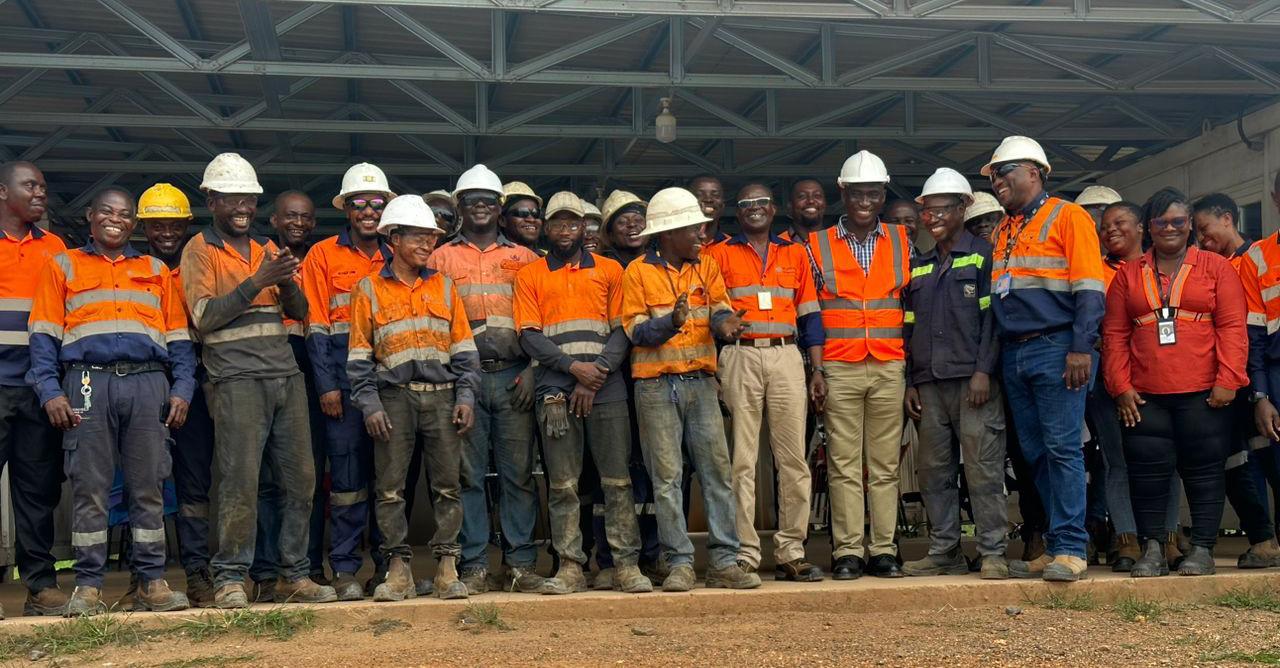


Mr. Joseph Titus-Glover Founder & CEO of Quantum LC Limited




an additional 24 months. A Joint Venture that the company formed with WBHO won another tender at the same mine during that period for Earthworks and Civil works for a BIOX Compartment, Holding Ponds, Expansion of Pipe Corridor and some remedial works at the South TSF.

Quantum LC’s involvement in Phase 1 and Phase 2 construction of the TSF at Beposo at AngloGold Ashanti’s Iduapriem Mine in Tarkwa were the next major milestones in Quantum’s journey. By incorporating a separate company called WBHOQuantum Limited, the Directors of the two companies were able to put together a competitive bid to execute both phases of the construction. By the peak construction of Phase 2 the staff strength of the Company at all locations will exceed 1,000 (one thousand) employees.
To grow a company, the Dream is important. The Dream must however be backed by competence and a clear strategy. Joseph Titus-Glover has both. The Founder of Quantum LC has employed intelligent financial engineering to secure the funding required for growth through diverse financing methods. All projects have been completed on time and all creditors have been paid on time much to the admiration of stakeholders and financiers. The introduction of Volvo’s R100E Rigid Dumper into the African market which took place
at Quantum’s instance with the purchase of 4 (four) brand new R100’s is evidence of the innovative financing approaches that Quantum adopts. The units were purchased for Phase 2 Construction of the TSF at AGA Iduapriem Mine at Beposo in Tarkwa.
By developing staff to grow into more senior positions, augmenting the team with strategic appointments at the appropriate levels, developing its codes of practice, policies and procedures, the company has developed its profile and consequently improved its capacity to bid competitively for all major mining and construction projects in Ghana.
With on-going projects at AngloGold Ashanti mines in Obuasi and Tarkwa, the company turned its attention to Newmont’s operations in Ghana. Previous attempts to secure projects with Newmont had failed but this was not a deterrent for management. The company kept knocking on Newmont’s doors. The doors finally opened when in June 2024, Quantum LC Ltd secured the 170 MT Raise of the TSF at Newmont’s Ahafo South Mine in Kenyase. This is yet another extension of the company’s footprint in Ghana. With mobilization more than 70% complete, the stage is set once more to bring all the years of expertise to bear on this new project in order to execute it to the satisfaction of our Client, Newmont.


In line with the company’s policy on social investment, Quantum has made several donations to the communities in which the company operates over the years. In 2024 alone, the Company has donated a brand new double cabin Isuzu Pickup to the Bidiem District Command of the Ghana Police Service in Obuasi, and has also donated $50,000 (Fifty Thousand United States Dollars) to the University of Mines and Technology (UMAT) Endowment Fund.
Quantum LC Ltd is on the rise. The journey has been exciting so far and the dream to own a Quantum Mine is still alive. The Board of the Company recently appointed a new Managing Director, who joins the Company after a stellar career spanning 26 (twentysix) years with Mining Giant, AngloGold Ashanti Limited in various management roles. This new appointment relieves the Founder and former Managing Director of daily operational involvement in the business. In his new position as CEO of Quantum LC Ltd, Joseph Titus-Glover has set his sights on the West African sub-region to further expand the company’s footprint, experience and influence. He says “Let us build this organization as best as we can, while we still have the strength to do so and let’s leave a strong legacy for future generations”.
The Volta River Authority (VRA) was established in 1961 to generate, transmit, and distribute electricity under the Volta River Development Act. However, in 2005, the VRA's mandate was largely restricted to electricity generation, creating an enabling environment for Independent Power Producers (IPPs) to enter the Ghana energy market. The transmission function was hived off into the Ghana Grid Company (GRIDCo), while the Northern Electricity Department (NED) evolved into the Northern Electricity Distribution Company (NEDCo), a wholly owned subsidiary of VRA.
As a strategic player in the energy sector VRA has diversified its generation source from hydro generation, and taken advantage of available and sustainable resources of energy mainly natural gas, renewables, and liquefied petroleum products. Currently, VRA operates a total installed generation capacity of 2,547MW, with two hydroelectric plants at Akosombo and Kpong generating installed capacities of 1,020MW
and 160MW respectively. Again, complemented by a 1,330MW thermal capacity from Aboadze, Tema, Kpone and Anwomaso, and 2.5MW, 6.5MW and 28MW Solar PV plants at Navrongo, Lawra and Kaleo respectively.
VRA also distributes electricity to about eleven (11) regions in the Northern sector of Ghana through its subsidiary, NEDCo. VRA has consistently demonstrated its social responsiveness through interventions aimed at enhancing the socio-economic and physical wellbeing of the riparian communities impacted by the operation of its two dams. With the vision to become a “Model of Excellence for Power Utilities in Africa,” VRA is wellpositioned to deliver reliable and affordable power to electricity consumers in a sustainable manner.

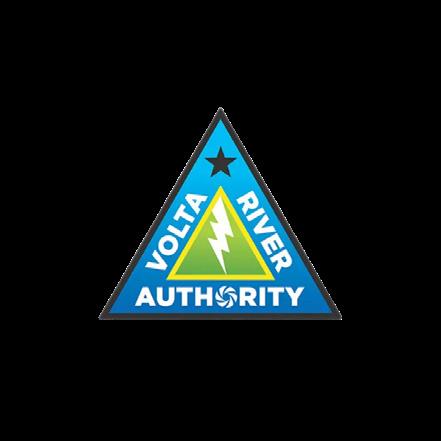
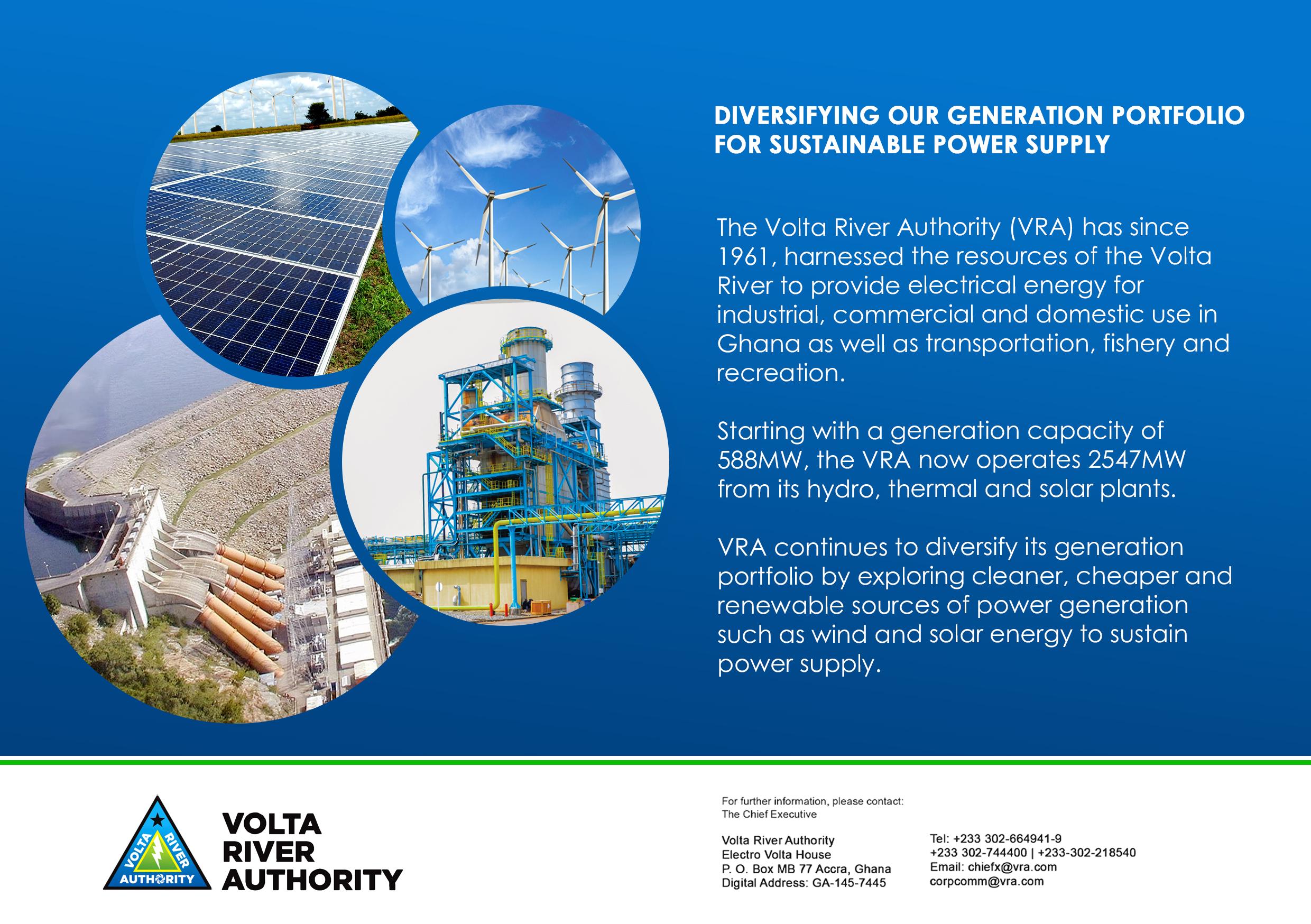
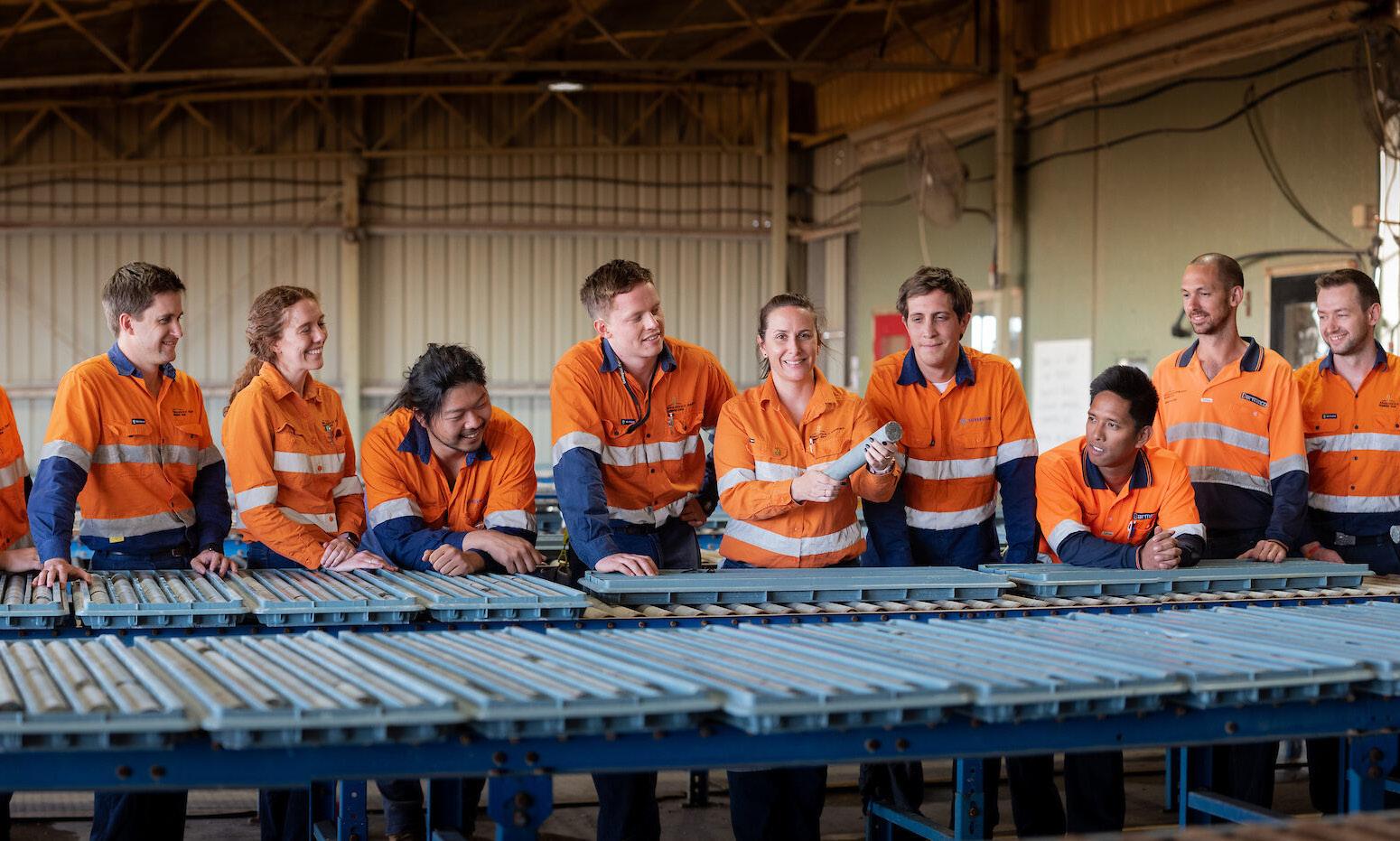
Now in Phase 3 of its redevelopment, the development of infrastructure necessary to support the planned ramp up in production to 5,000tpd is underway. Completion of Phase 3 is expected by the end of 2024.
The mine has made history recently, setting a new world record with the safe completion of the Kwesi Mensa Ventilation Shaft (KMVS), a vital part of the mine’s redevelopment.. At a depth of 941 metres and a diameter of 6.5m, the KMVS is the world’s largest raisebore hole, providing ventilation to the Kwesi Mensa Shaft (KMS) infrastructure.
Successful completion of the KMVS was made possible through collaboration between AngloGold Ashanti Ghana and Redpath Thonket, a mining contracting and engineering firm. Importantly, this was achieved with an excellent safety record by the raiseboring team, including local contractors such as Mining Tools Ghana, MAC Partners, and MCS Ghana.
Current statistics released by AngloGold Ashanti shows a mineral reserve of 7.11 Moz
of gold, with a gold production of 224 koz at the Obuasi Mine.
Mining companies across the world have come a long way in recognising the importance of sustainable mining, not only for the longevity of business, but for the longevity of the land and communities in which it works.
Core to AngloGold Ashanti is its aim to be responsible steward of the environments in which it operates by: mitigating impacts from operations; engaging constructively with communities; and working to fairly share benefits of mining among its stakeholders.
One such initiative has taken place at the Obuasi mine. In May 2024 it was announced that AngloGold Ashanti has allocated 60,000 more oil palm seedlings to farmers in six districts in the Ashanti Region (further to distributing 30,000 high-yielding oil palm seedlings to farmers in the region in 2023).


The purpose of this initiative (the Climate Resilience Oil Palm Plantation, or CROPP, project) is to support the improvement of farmer’s livelihoods in the region through oil palm production, whilst also contributing to Ghana’s deforestation mitigation targets.
Meanwhile, AngloGold Ashanti’s SEDP articulates the social investment strategy for Obuasi mine for the period until 2031. The ten-year plan focuses on three intermediate outcomes: improved social development; a diversified and sustained local economy; and improved partnerships.
Underpinning the key outcomes, AngloGold Ashanti will make efforts in quality health services, education, skills development, access to water, sanitation, and hygiene, community infrastructure, industrialisation, agriculture, and business development and entrepreneurship.
Since the SEDPs launch in August 2022, AngloGold Ashanti Ghana has provided water systems to four communities with plans for five more communities in 2023.
Working alongside the Environmental Protection Agency, traditional authorities, and local government, the mining business has established the “Keep Obuasi Clean” campaign. The campaign promotes hygiene with a monthly cleanup exercise, with similar programmes being run in schools where pupils will serve as ambassadors to ensure longevity of the initiative.
“All the SEDP interventions are approached with due regard for equity, diversity, and inclusion, which are integral to the process, making provision to support women, youth and physically challenged community members,” says the program report.
Continuous implementation of the tenyear plan is aligned with the business sustainability performance of Ghana’s Obusai mine, with the aim to establish sustainable businesses that support livelihoods long after the life of the mine.

In a collaborative effort to bolster local economic growth, empowerment, and the promotion of sustainable business development, AngloGold Ashanti’s Obuasi Mine has partnered with Absa Bank Ghana Limited
In conjunction with the MasterCard Foundation, the initiative provides support for the development of small and medium-sized enterprises in Obuasi, providing impetus to the future economic landscape of the region. These include: Four projects have been outlined: Business Acceleration and Sustainability (BAST); Women in e-commerce; Business Supply Chain Development; and the Artisans to Entrepreneurs (A2E) project.
BAST supports SMEs in strengthening their capabilities, by assisting with organisational systems and models. This aims to improve their capacity to secure financing, and access markets more effectively.
Emphasising Obuasi’s commitment to gender equity and empowering women, the Women in e-commerce project strives to accelerate and maintain the progress and success of women in the e-commerce and the digital economy. The project aims to provide opportunities and resources for female entrepreneurs to thrive in the digital marketplace, enhancing economic empowerment and overall wellbeing.
Business Supply Chain Development focuses on developing the capabilities

of local businesses in Obuasi, aiming to improve their ability to secure contracts and meet requirements required by AngloGold Ashanti’s Obuasi mine. Simultaneously, it aims to strengthen and enhance Obuasi mine’s supply chain networks, ensuring seamless operations and increased efficiency.
Finally, Obuasi’s A2E Project aims to develop the skills of younger artisans in the region, supporting them to grow their income levels through training in vocational, technical, and entrepreneurial skills. The Obuasi mine also hopes that this project will help to preserve traditional technical and vocational trades, while nurturing a sustainable environment that recognises the contributions of Obuasi’s skilled artisans to local economic growth.
Emmanuel Baidoo, Senior Sustainability Manager at Obuasi Mine and Head of Community Relations, emphasised the strategic significance of each of the four projects, highlighting their potential to direct the focus of Obuasi communities, and local youth groups to build sustainable livelihoods outside the conventional operational confines of the mining industry.
SMEs are essential contributors to Ghana’s economy, providing 60% of GDP and 80% of private sector employment opportunities, with these initiatives highlighting the value that AngloGold Ashanti and its Obuasi mine provides to the country.
www.anglogoldashanti.com

Banksy
Banksy’s Latest Surprise
Unveiled at London Zoo Aviation
Ethiopia’s New $6 Billion Mega Airport Travel
IHG Hotels & Resorts
Unveils Verno House Budapest




In an unexpected turn of events, employees at the London Zoo were greeted with a new “exhibit” on Tuesday morning, courtesy of the elusive street artist Banksy. This time, Banksy left his mark with a mural that seemed to suggest the zoo animals were being set free.

The artwork depicts a gorilla holding up the entrance gate while birds take flight and a sea lion makes a break for freedom. Adding to the sense of mystery, three pairs of eyes peer out from the darkness inside the gate, inviting viewers to imagine what creatures might be lurking.
This mural might provide a clue to the recent sightings of Banksy’s animalthemed artwork across London. Over the past month, his creations—a mountain goat perched on a building buttress, piranhas circling a police guard post, and a rhinoceros atop a car—have been appearing in the most unexpected locations.
On August 12, 2024, a Banksy rhino was spotted on a wall in Charlton, Southeast London, causing a stir among locals. A few days earlier, three monkeys appeared on a bridge over Brick Lane, attracting crowds eager to capture the moment. Each of these pieces was shared on Banksy’s Instagram with the hashtag #LondonZoo, hinting at a larger theme but leaving the exact location of the final piece a mystery.

One of the zoo’s animal operations managers discovered the mural early in the morning, just as he was preparing to feed the animals. By that time, earlymorning cyclists in Regent’s Park, where the zoo is located, had already started taking selfies with the new Banksy creation.
To showcase the work, the zoo kept the roll-down shutter closed all day, drawing a crowd of its own despite the busy tourist season. Banksy’s global reputation, built from spray-painting buildings in Bristol, England, has made him one of the most celebrated and enigmatic artists of our time. His pieces, which often fetch millions at auction, are also prime targets for theft and vandalism. Later in the day, zoo staff covered the mural with a transparent plastic shield to protect it.
This isn’t the first of Banksy’s latest works to face such challenges. The rhino that appeared on Monday was quickly tagged with graffiti, while a silhouette

of a howling wolf on a rooftop satellite dish disappeared within hours of being discovered last week. A big cat, elegantly stretching out on a dilapidated billboard, was removed by three men who claimed they were hired for safety reasons.
In another instance, a police sentry box transformed into a fish tank was relocated from near the Old Bailey courthouse to the City of London’s corporate offices for safekeeping, with plans to eventually put it on public display.
Whether the zoo mural is the final piece in this series remains to be seen. The zoo staff are thrilled that Banksy chose the zoo as a canvas. The primate is speculated to be a western lowland gorilla, an endangered species housed at the zoo. Additionally, one of the birds in the mural might be a macaw, while another creature could be a bat.
As for the eyes peering out from the gate—there’s speculation they might belong to cats, but the true meaning behind the mural remains a mystery. Only Banksy knows the full story behind his art.


Zaha Hadid Architects and Pascall+Watson Architects have been selected as key players in the consortium tasked with designing the first phase of a groundbreaking new airport in Ethiopia. Valued at $6 billion, this phase marks the beginning of what is poised to become Africa’s largest airport.
These UK-based architectural firms are collaborating with Dar Al-Handasah, a multidisciplinary leader in global infrastructure projects, on the expansive development at Abusera, located south of Ethiopia’s capital, Addis Ababa. The consortium also includes aviation consultants Landrum & Brown and engineers TY Lin, ensuring a comprehensive approach to the ambitious project.
Strategically positioned at the intersection of Africa, Asia, and the Middle East, the airport is set to initially accommodate 60 million passengers annually, with plans to expand its capacity to 110 million passengers as subsequent phases are completed.
Spanning an impressive 35km², the project will deliver 600,000m² of passenger facilities, 126,000m² of airline support facilities, two parallel runways, and over 100,000m² dedicated to cargo and other support buildings.
This significant development is supported by Ethiopian Airlines Group, a rapidly expanding airline that has outgrown its current hub at Bole International Airport. With Bole lacking space for further expansion, the new airport will offer a modern solution to meet the airline's growing needs.
The new airport's location is strategically chosen to allow for scalable growth to meet future demands. Situated at a lower altitude than Bole International, the new site will enhance aircraft performance during take-off, enabling Ethiopian Airlines to maximize the capabilities of its stateof-the-art fleet. This will facilitate more passengers and cargo being transported to a broader range of global destinations on longer, non-stop flights while consuming less fuel.
The first phase of the airport is scheduled for completion by 2029, and once fully operational, it will have four times the capacity of the existing Bole International Airport.
This project will join an impressive portfolio of airport designs by Zaha Hadid Architects, including the renowned Daxing International Airport in China, completed in 2019, and the ongoing Western Sydney International Airport project.
Pascall+Watson, with a track record of over 2,000 aviation projects across 70 airports in 35 countries, brings extensive expertise to this landmark development.
The Abusera airport is set to become a global gateway for Africa, positioning Ethiopia as a central hub in the continent’s transportation networks. The design will incorporate elements of local culture, aiming to create one of the world's most efficient international transport hubs with a distinct Ethiopian identity. Additionally, the airport will feature on-site renewable power generation, natural ventilation, and will be connected to Addis Ababa via a new express rail link, enhancing accessibility and sustainability.






Budapest, August 2024 – IHG Hotels & Resorts is thrilled to introduce Verno House Budapest to its Vignette Collection, further expanding its luxury and lifestyle portfolio, which now stands as the second largest in the world. This boutique retreat, set to open this summer, marks the Hungarian debut of IHG’s first collection brand, known for its carefully selected hotels that offer distinctive, unforgettable stays in some of the world’s most captivating destinations.
Verno House Budapest, Vignette Collection, is more than just a hotel—it's an urban oasis where guests can bond, breathe, and bloom. Situated in the heart of Budapest, this unique property serves as a meeting point for travellers and locals alike, fostering a deeper connection with the city’s spirit. The hotel is inspired by a 19th-century Budapestian concept that true appreciation of a city’s modernity requires access to a nurturing natural environment as an escape. This philosophy is at the core of Verno House, making it the perfect sanctuary to recharge before diving into the next day’s explorations.
Nestled between the Danube River and Liberty Square, Verno House has historically been a cultural hub, frequented by artists, politicians, scientists, and philanthropists since the late 19th century. Today, it continues to serve this role, with the city's most iconic attractions just a stone’s throw away. Guests can immerse themselves in Budapest’s rich cultural heritage and then retreat to the luxurious comfort of Verno House, ideally situated at the corner of Szabadság Street and October 6th Street.





As with all Vignette Collection properties, Verno House Budapest offers a travel experience that is both authentic and unique. A hallmark of the Vignette Collection is the "Memorable Rituals," which celebrate each hotel’s individuality. At Verno House, this is embodied in the Treat Bar, a nostalgic corner in the lobby that offers a sweet journey through Hungary’s culinary traditions. Guests can savour iconic candies and chocolates that have delighted generations, providing a moment of indulgence and a break from the city's fast pace.

In alignment with IHG’s Journey to Tomorrow initiative, Verno House Budapest is committed to making a positive impact on the local community. Each Vignette Collection hotel partners with a local non-profit organisation to support meaningful causes. At Verno House, this commitment is fulfilled through a partnership with Kék Madár Alapítvány (Blue Bird Foundation), which promotes workplace opportunities for individuals with disabilities. Guests can contribute to this cause by purchasing chocolates from the BeSweet brand, crafted by employees with disabilities and available in the mini bar.
Verno House Budapest is thoughtfully designed to be a sanctuary where guests can recharge their bodies and minds. The hotel’s wellness space is a key part of this experience, offering a haven of relaxation right in the centre of Budapest’s lively downtown. Whether you’re winding down after a day of exploring or preparing for a new adventure, the spa at Verno House provides the perfect environment to relax, renew, and rejuvenate. It features a Turkish steam bath, Finnish sauna, whirlpool bath, and a fitness centre, along with a menu of indulgent massage and facial treatments using all-natural products.
The design of Verno House reflects its role as a place where guests can bond, breathe, and bloom. Abundant natural light, lush greenery, and vibrant pops of colour are complemented by a signature cedarwood scent, creating an atmosphere of vibrant serenity. The public spaces are adorned with warm hues, neutral tones, abstract furniture, and sculptural lighting, fostering a welcoming and communal environment. Guests and locals alike are encouraged to gather, with books and board games available to enhance the sense of community.
The hotel’s 48 elegantly appointed guest rooms are equipped with locally produced BOTANIQ Collection amenities and offer stunning urban views. Guests can choose from Deluxe, Premium, and Suite options, with the Corner Suites featuring floor-toceiling windows that showcase Budapest’s iconic Art Nouveau architecture.


The Michelin Guide-recommended Flava Kitchen & More at Verno House offers a culinary experience that combines the flavours of North Africa, Latin America, and the Middle East with traditional Hungarian dishes. Standout menu items include Chicken Lahmacun, Beef Cheek Stew with spätzle and mushrooms, and Goulash. The dining experience is complemented by an extensive selection of Hungarian and international wines, champagnes, and cocktails. Guests can enjoy their meals in the vibrant indoor setting or on the charming terrace for an al-fresco experience, with a live DJ enhancing the ambiance on weekends.
Verno House Budapest, Vignette Collection, is perfectly positioned for guests to explore the city’s most iconic attractions, including the Hungarian State Opera House, St. Stephen’s Basilica, and the Dohany Street Synagogue, Europe’s largest synagogue. Whether immersing themselves in Budapest’s cultural treasures or relaxing in the hotel’s serene surroundings, guests at Verno House are guaranteed a truly unforgettable stay.
For more information or to book your stay at Verno House Budapest, Vignette Collection, visit https://www.ihg.com/ vignettecollection/hotels/us/en/budapest/budvh/hoteldetail
Jamie Waite
Group CEO, Be Media jamie.waite@busenq.com
Jason Westgate Chief Commercial Officer jason.westgate@busenq.com
Bryonie Knowles Project Director b.knowles@busenq.com
Gary Smith
Senior Project Director gary.smith@busenq.com
Jess Collins
Project Director jess.collins@busenq.com
Munim Sikder
Project Director munim.sikder@busenq.com
Utkarsh Sharma
Project Director utkarsh.sharma@busenq.com
Glen Newton
Project Director g.newton@busenq.com
Adel Mhiri
Project Director adel.m@busenq.com
Paris Cressy Branding & Marketing Executive paris.cressy@busenq.com
Hawi Okello Project Director hawi.okello@busenq.com
Rory Keane
Project Director rory.keane@busenq.com
Claire Dunn
Global Credit Controller claire.dunn@busenq.com
Bethany Waite Credit Controller bethany.waite@busenq.com
Tanya Rudd Head of Finance tanya.rudd@busenq.com
Natoya Rimmer Global Head of Accounts natoya.rimmer@busenq.com
Kumar Nil-Khan Senior Data Strategy kumar.nilkhan@busenq.com
Simon Ferrening Production Manager Commercial Performance Analysis
Anita Terrell Social Media Manager anita.terrell@busenq.com
Lee Dixon Social Media Manager lee.dixon@busenq.com
HR
Susan Tumelty HR Partnered Company info@hrdept.co.uk
Chloe Bird Birketts LLP Norwich


Laura Watling Editor in Chief laura.watling@busenq.com EDITORIAL
Carol Gibson Lead Editor carol.gibson@busenq.com
Rebecca Matthews Senior Journalist rebecca.matthews@busenq.com
PRODUCTION
Roisin Reynolds Head of Production roisin.reynolds@busenq.com
Cheraleigh Van Zanten Production Manager cheraleigh.vanzanten@busenq.com
Jamie Bolton Head of Design jamie.bolton@busenq.com
Shah Abbas Head of Video & Content Creation shah.abbas@busenq.com

Matt Hardwick Online Website Manager matt.hardwick@busenq.com
WEBSITE PHOTOGRAPHY
Didie Nturo Lead Photographer didie.nturo@busenq.com















A modern network must be able to respond easily, quickly and flexibly to the growing needs of today’s digital business. Must provide visibility & control of applications, users and devices on and off the network and Intelligently direct traffic across the WAN. Be scalable and automate the process to provide new innovative services. Support IoT devices and utilize state-of-the-art technologies such as real-time analytics, ML and AI. And all these must be provided with maximum security and minimum cost.
This is the power that brings the integration of two cloud managed platforms, Cisco Meraki and Cisco Umbrella. This integration is binding together the best of breed in cloud-managed networking and Security. cisco.com